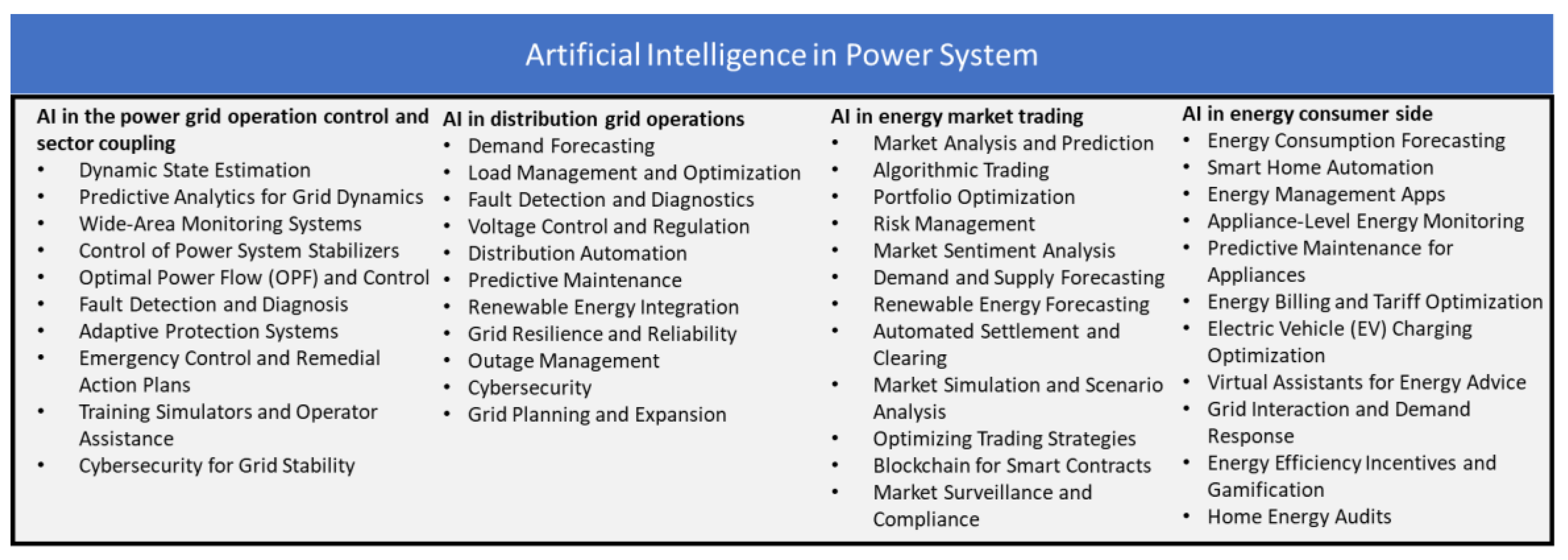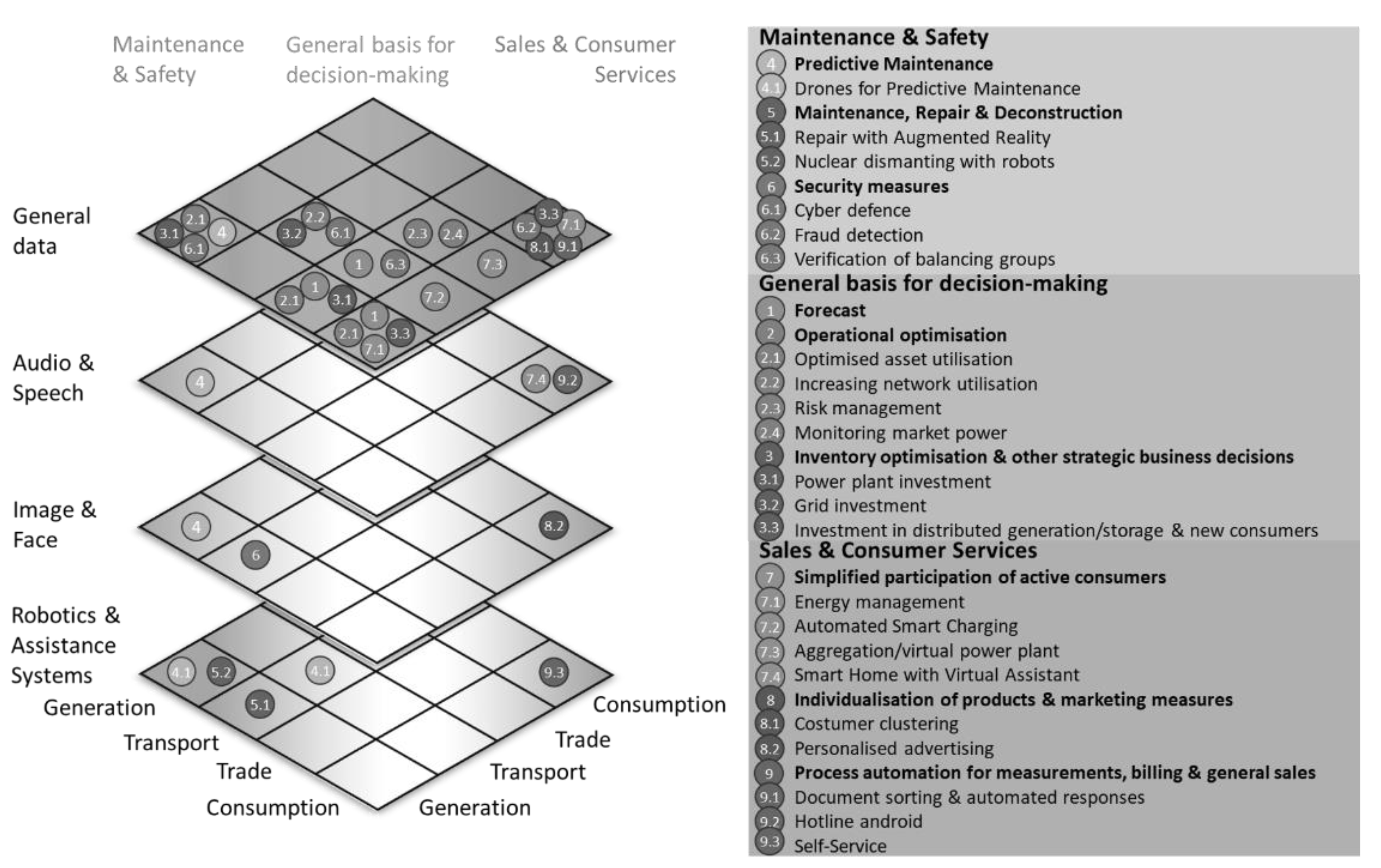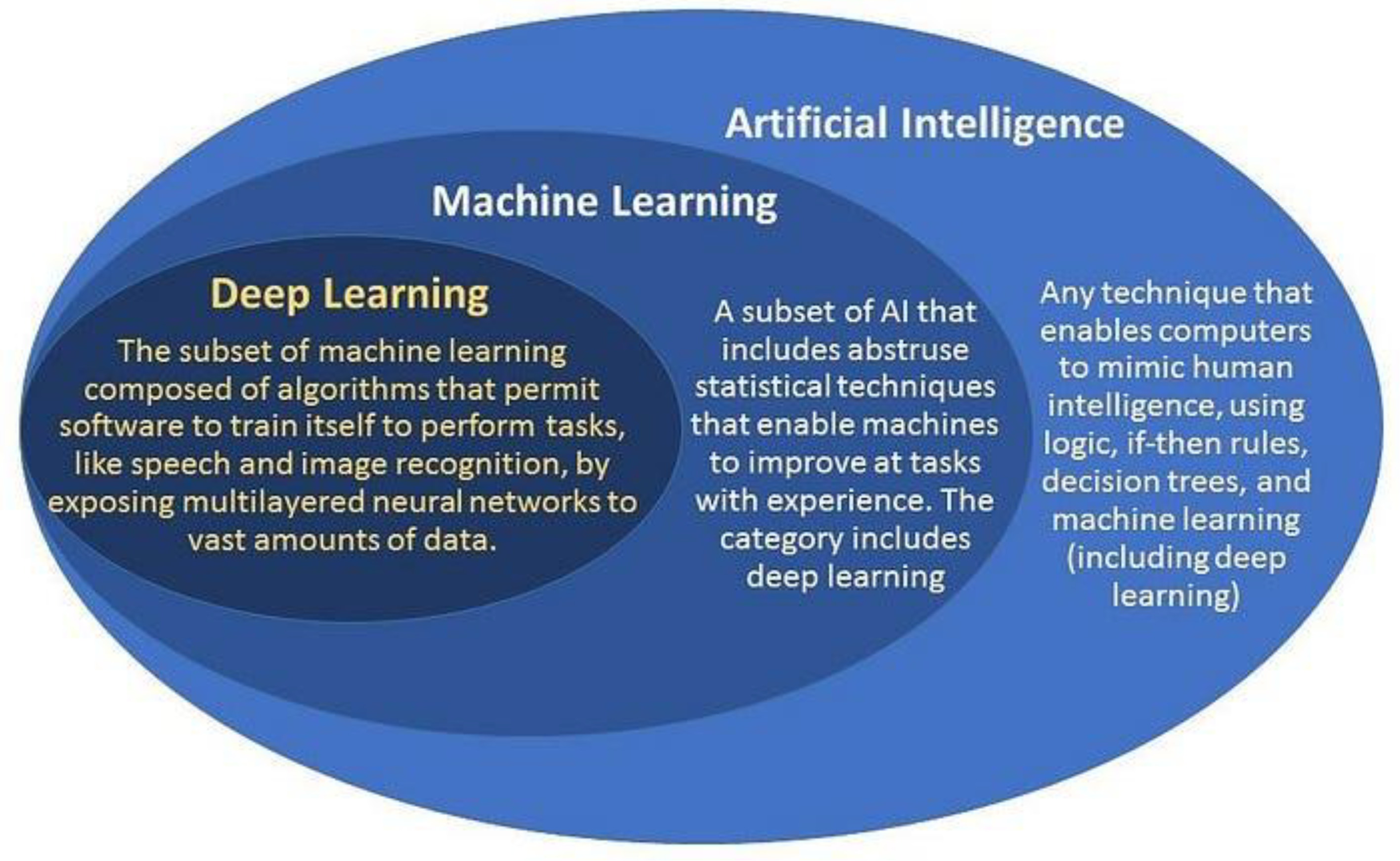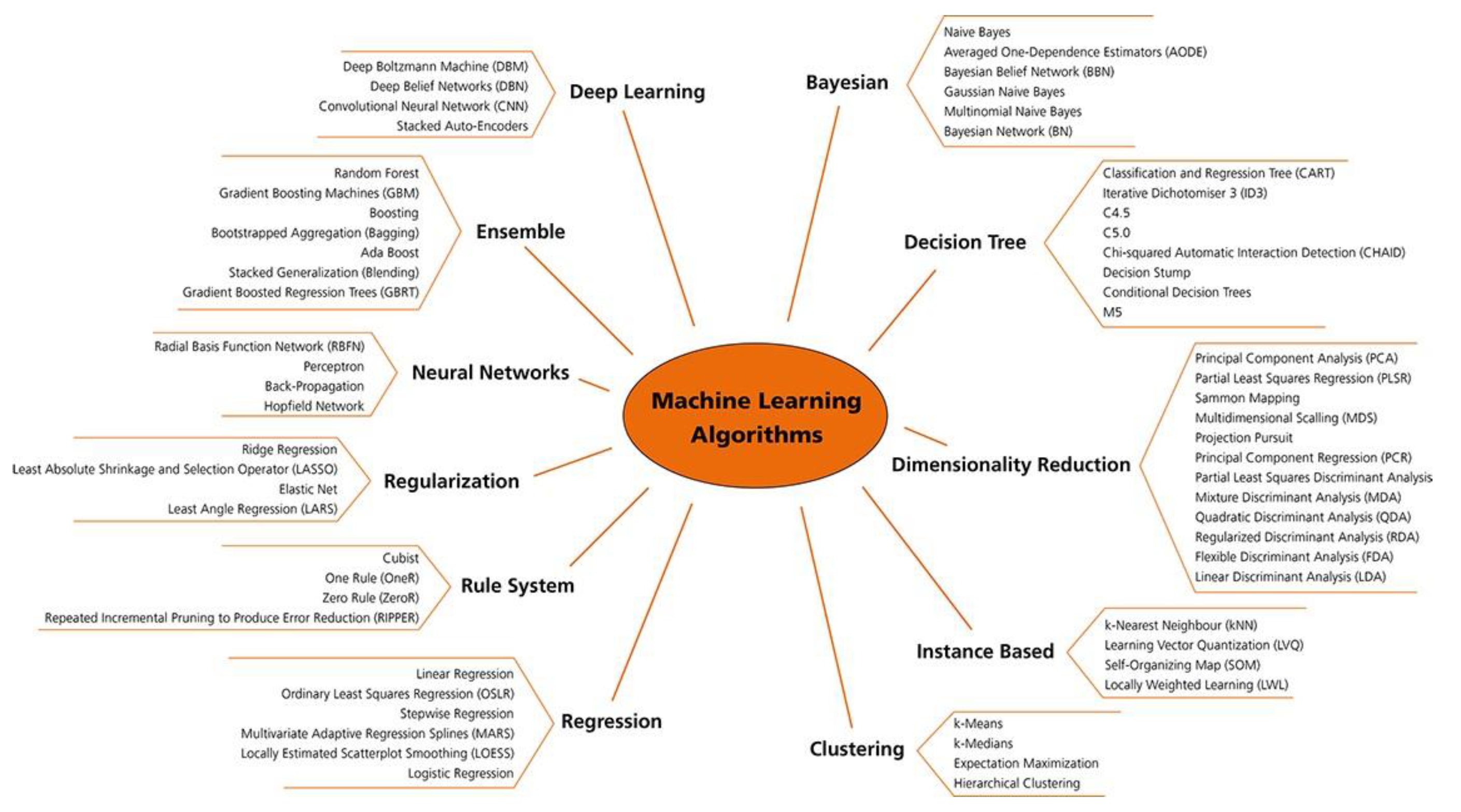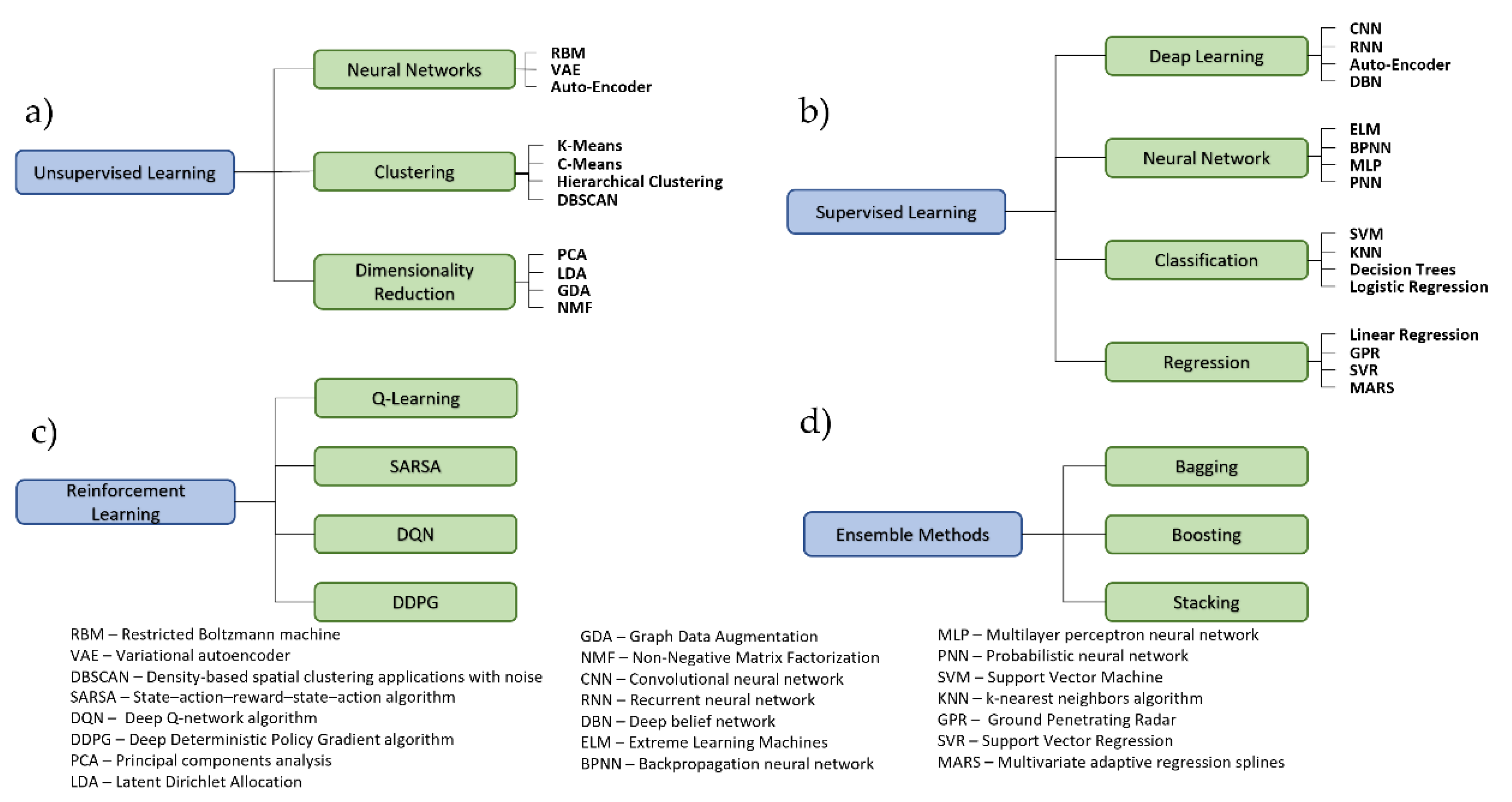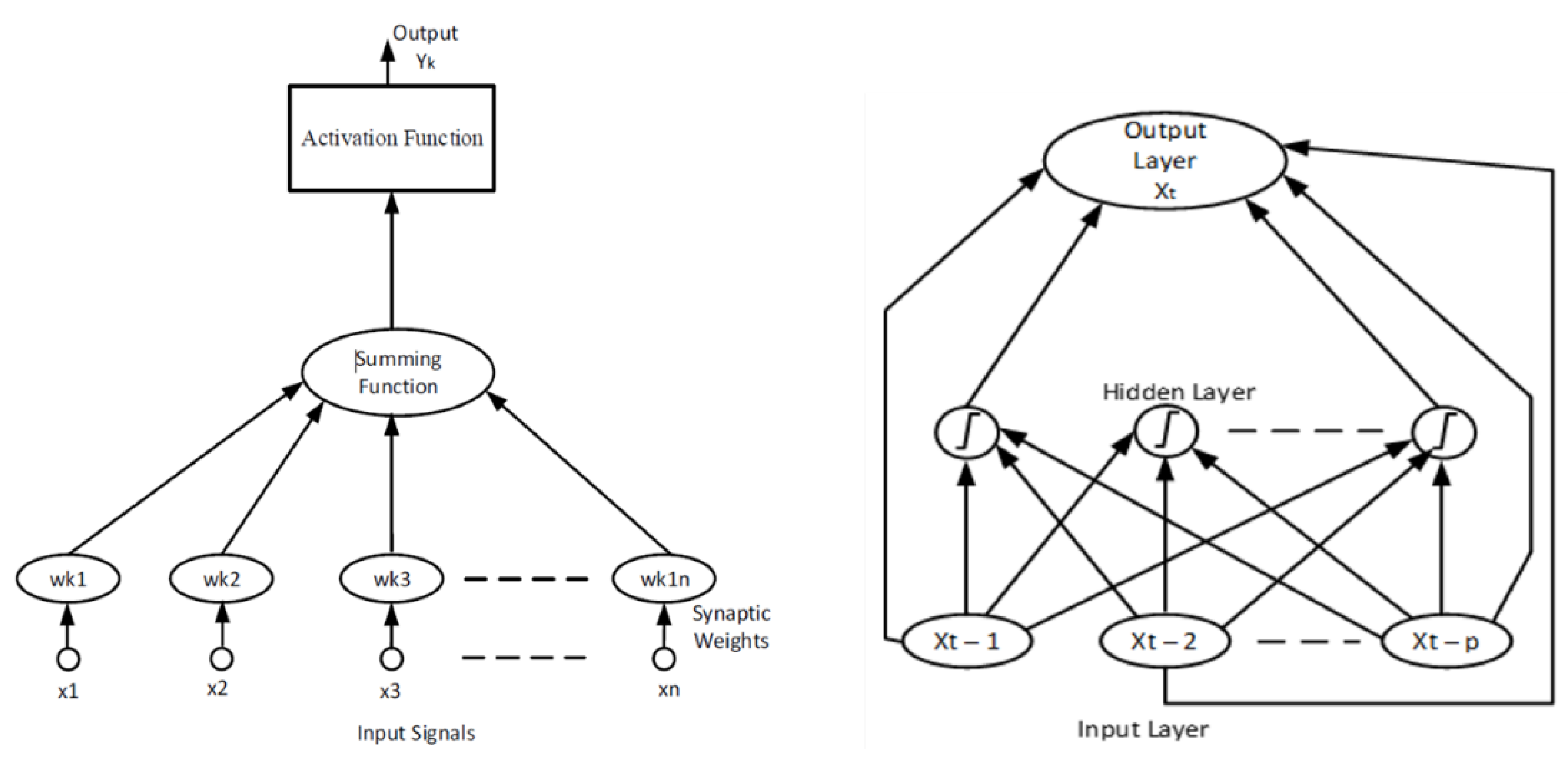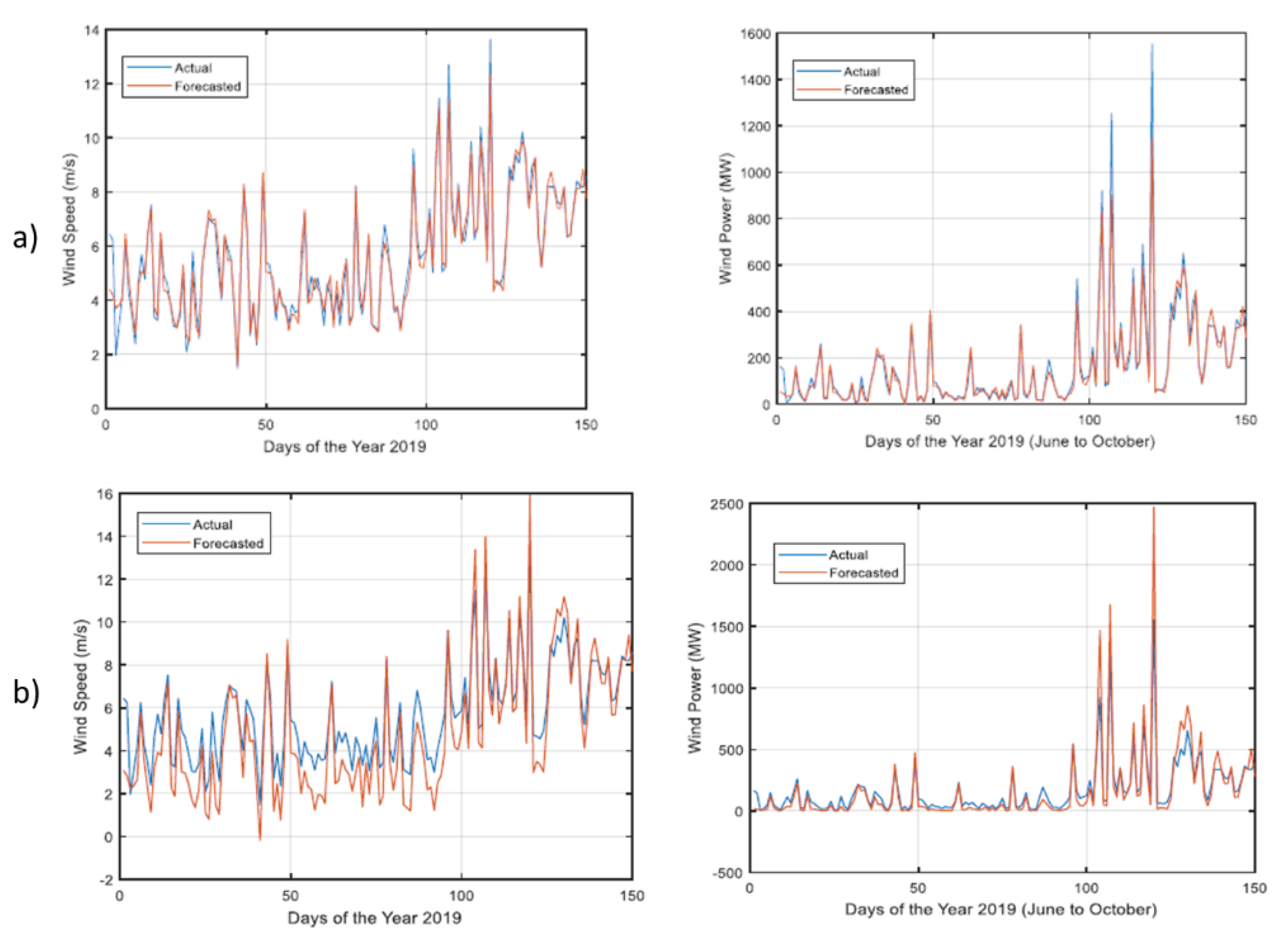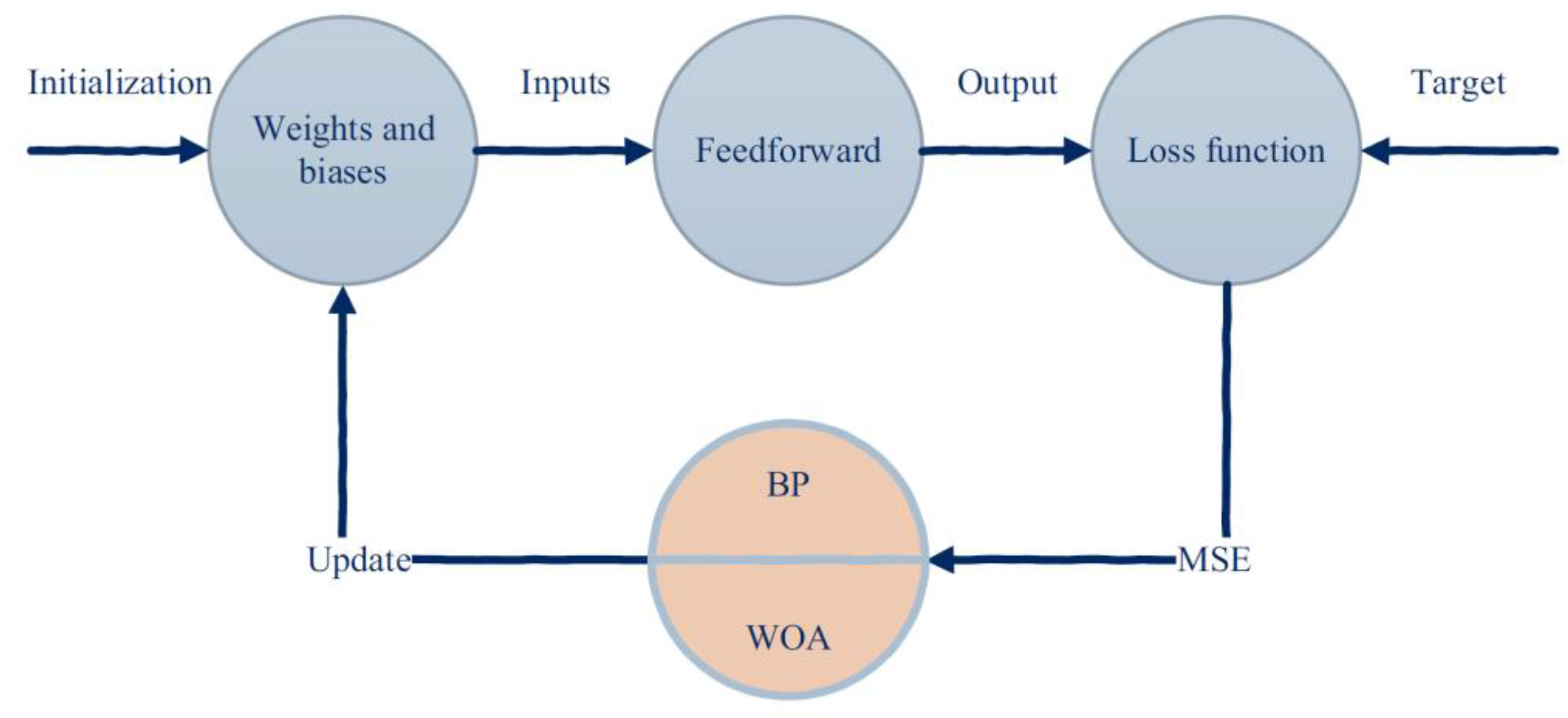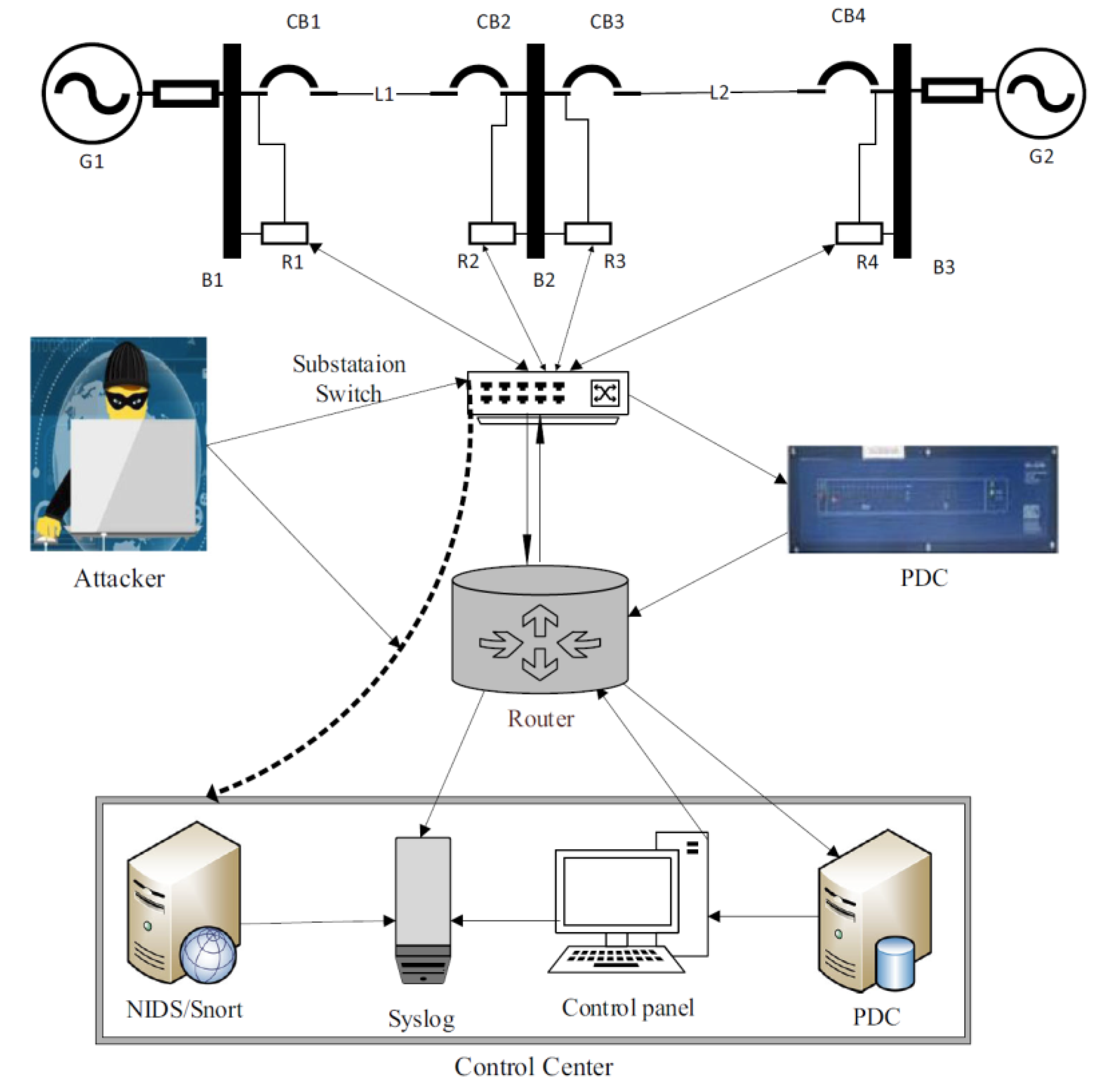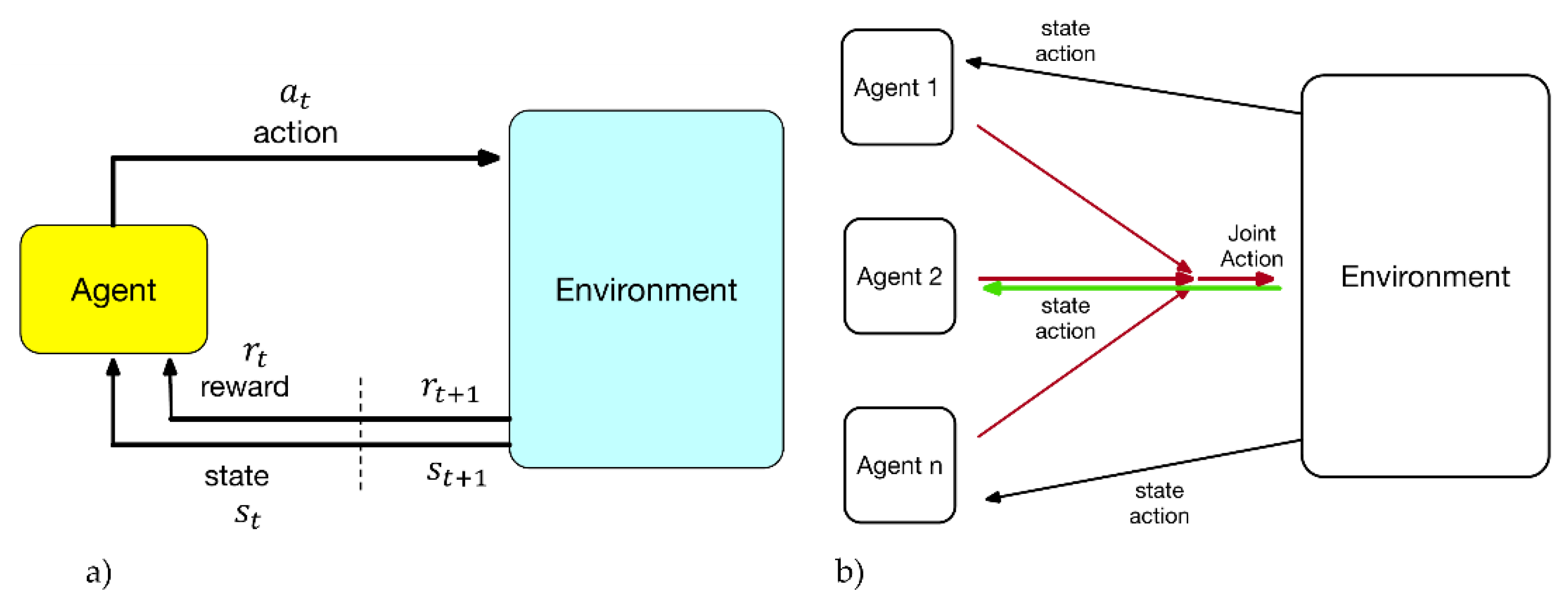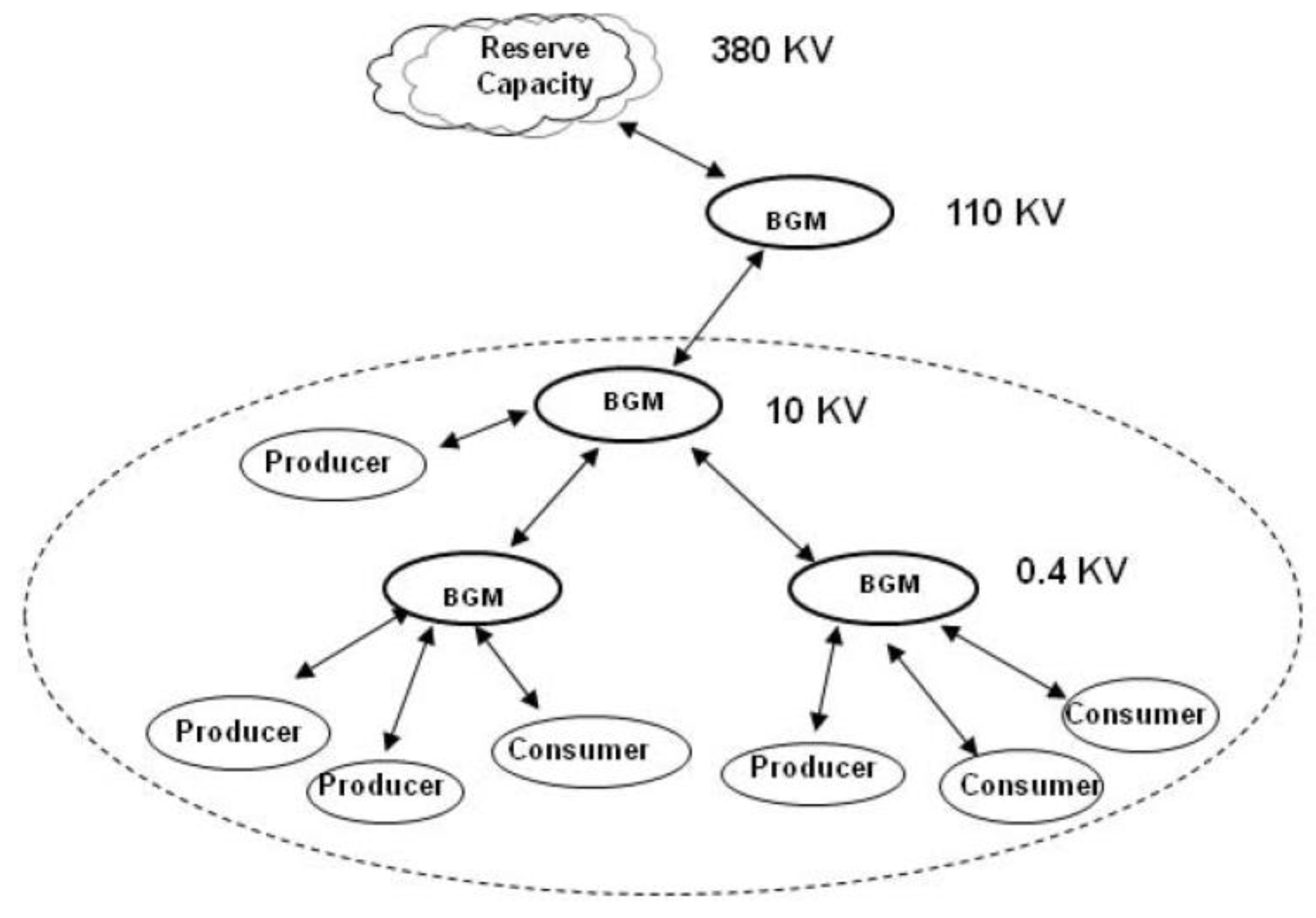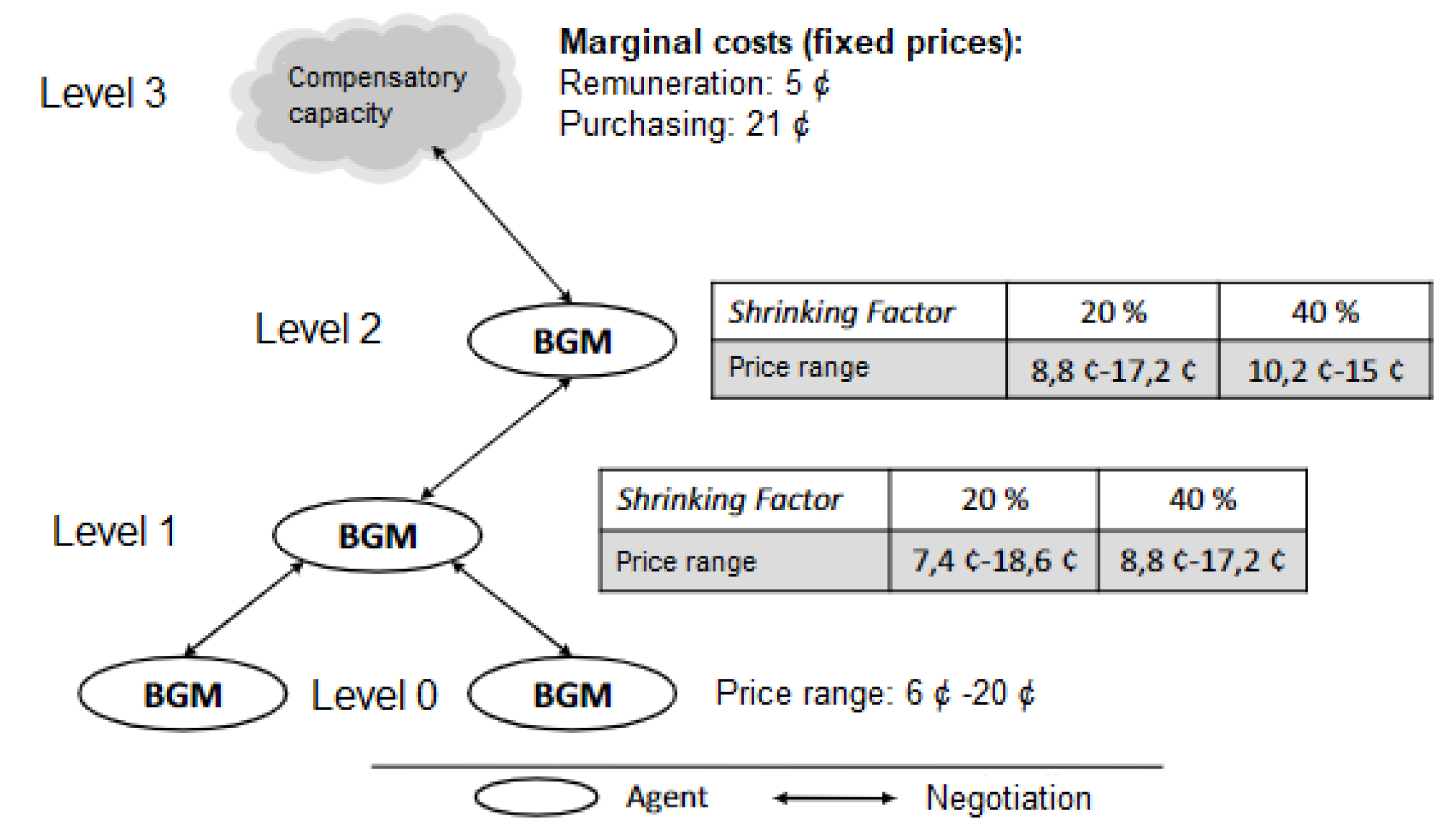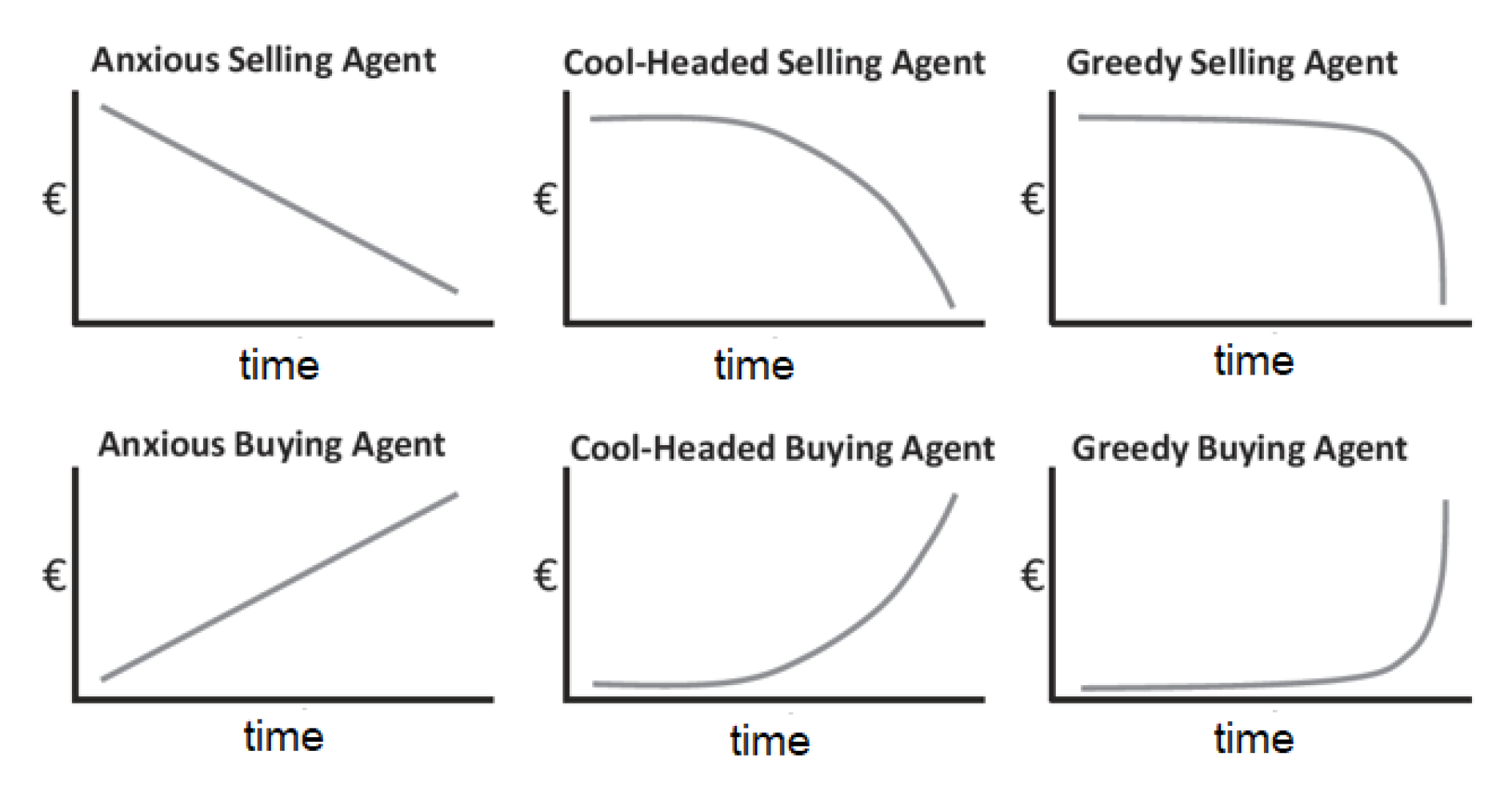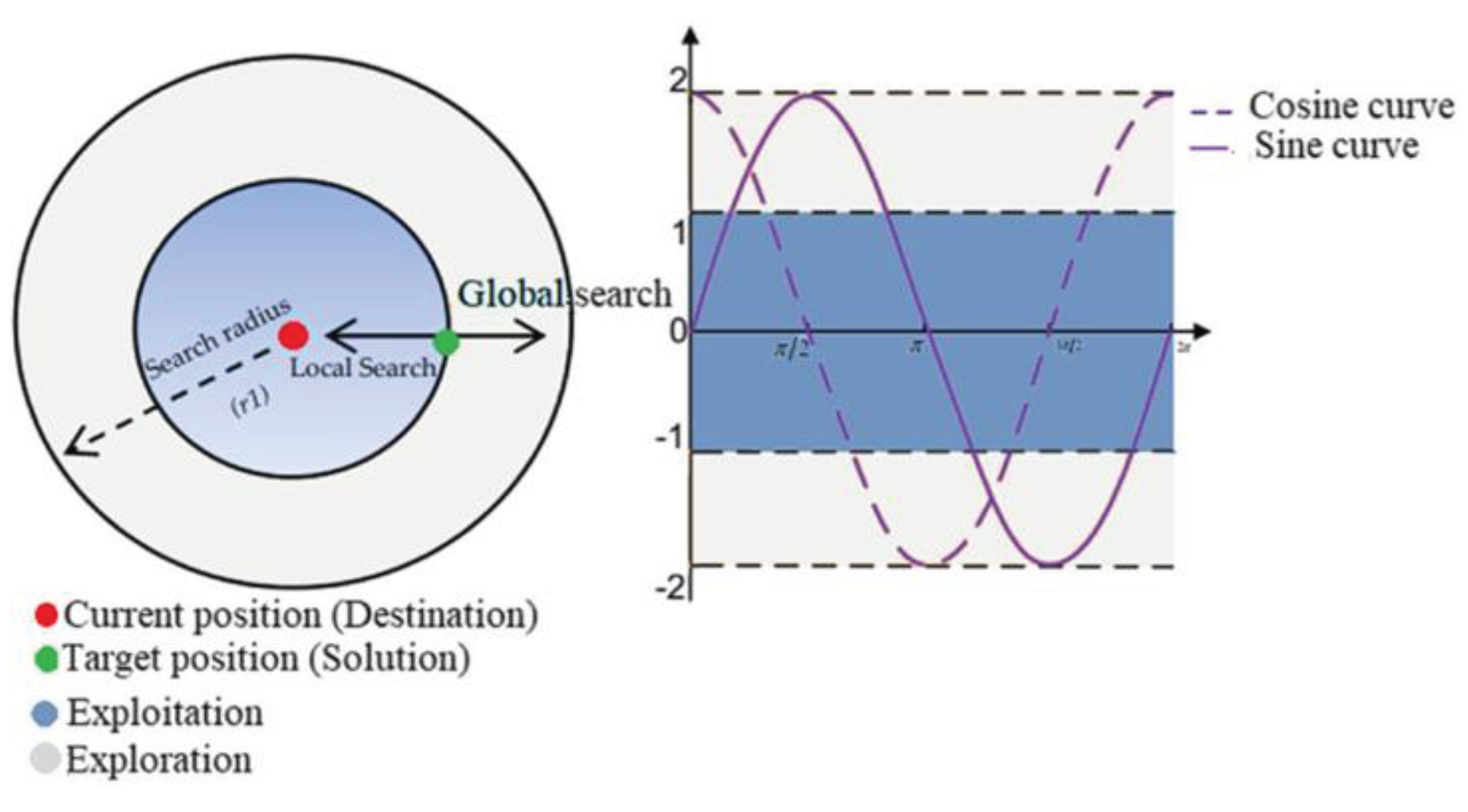1. Introduction
The power system providers are quite conservative by the introduction of the technologies because of very high requirements concerning the safe and reliable delivery of electric energy. The new hardware and software application must be also extremely reliable before implementing in to the power system operation.
The application of artificial intelligence algorithms in the power systems was an intensively discussed topic since 70 and 80. 1986 the CIGRE established a working Group 38.06 Expert System in Power System which could be fixed as the start for first applications in scope of the international cooperation in this field [
1]. Today applications of AI have gained a new dimension and perspective. On the one hand, through advancing computer hardware, computational technology, and the technologies for processing of large datasets like Big Data. On the other hand, the complexity of planning and operation of modern, decentralized power systems (especially with high generation from renewable sources) requires new, fast, intelligent and adaptive operation algorithms, also based on continuously measured real data. This evolutionary process is substantiated by older sources that highlight the longstanding existence of AI methods [
2,
3].
The machine learning (ML) used extensively last years is often associated with AI (artificial intelligence) and lot of such algorithms has already been successfully implemented not only in the energy system. AI and ML can also be found in other economic sectors. For example, it is used in medicine to diagnose diseases, in finance to analyse markets, in the automotive industry for autonomous driving and even in agriculture to optimize crop yields [
4]. In the energy sector, AI is systematically used to improve the flexibility of the power grid, maximize transmission efficiency, optimize communication protocols and control distribution networks. Applications such as neural networks and fuzzy logic are used to recognize complex patterns in the data and make predictions about energy consumption and grid stability [
5].
This paper therefore aims to provide 4 application examples for the use of AI in the electric power system. A distinction is made here with regard to the area of application in combination with a suitable ML method.
Following the decentralisation and digitalisation of the power grid, the current trend in research is to use data to improve electricity transmission, distribution and make it more reliable and efficient. This data (measurement) includes consumption data collected by electricity meters at various consumption points such as households, businesses or industrial plants. Generation data, on the other hand, records the amount of energy from power plants, solar and wind installations, typically via monitoring systems or SCADA systems. Grid data, such as voltage, current and phase angle, is collected by sensors and monitoring devices in the electricity grid. Market data, including electricity prices and demand forecasts, comes from market platforms or specialized data providers. Planning data, on the other hand, includes load and generation forecasts that estimate future electricity consumption and energy generation based on historical data and weather forecasts. Grid capacity planning documents contain information on planned expansion projects and infrastructure changes in the electricity grid. Market analyses, in turn, provide insights into future market conditions and price developments in the electricity sector. Smart grids are an application area that not only transmits electricity, but also realizes data transfer between different actuators. For example, data can be exchanged between electrical generation and load units as well as directly with a control system [
5,
6,
7]. The data originating from smart grids consists of information management, control technologies, digital sensing, communication technologies and field devices used to coordinate multiple electrical processes. Since conventional modelling techniques have significant limitations in calculating such amounts of data, the use of AI algorithms is becoming increasingly obvious [
4,
8,
9]. The increasing significance of AI goes hand in hand with the availability of cost-effective computers. This is relevant for several reasons: Firstly, AI algorithms, particularly in the realm of machine learning and neural networks, demand substantial computational power. Thanks to affordable hardware and cloud computing, it is now possible to scale these resources affordably, facilitating the implementation of AI solutions across various application domains. Secondly, accessible technology lowers entry barriers, enabling businesses and developers to embrace AI more readily and promoting its widespread use in diverse industries. Thirdly, the availability of cost-effective computers fosters research and innovation in the field of AI. Developers can conduct experimental projects, explore new models, and contribute to the continuous development and enhancement of AI technology [
10]. The most essential prerequisite for the increased use of AI throughout power systems is the digitisation of the energy sector, as well as the availability of the necessary large data sets which could be fast analysed from different point of view [
11]. This all is necessary because of increased system dynamics e.g. throw higher integration of renewable energies, higher load flexibility and fast response storage integrations. By analysing and evaluating the large data sets, the processes in the energy industry can be made more sustainable and secure. Some of the challenges that can be derived from this for an intelligent power grid are the forecasting of load profiles, the evaluation of the stability of the power grid, fault detection and grid security. These challenges can be addressed through multi-dimensional and multi-layered data collection about the operation of the power grid. However, traditional technologies such as modelling, optimisation and control technologies can only solve these challenges to a limited extent. Therefore, the use of AI methods in the electric power grid is becoming more justified. AI techniques use vast amounts of data to create intelligent machines that can handle tasks that require human intelligence. However, ML is not only one way to implement AI systems. Other possibilities of AI systems include neural networks [
12], robotics, expert systems (ES), fuzzy logic (FL) [
13] and natural language processing [
14]. Overall, AI technologies enable fast and accurate decision making due to processing large amounts of structured and unstructured data. In smart grids applications, AI can be defined as computers mimicking the cognitive functions of grid operators to achieve self-healing capabilities. However, AI cannot replace the grid operator in some cases, as it is presented in [
11].
The subdivision of AI in the power grid can be of two types: virtual AI and physical AI. Virtual AI systems include informatics that assist grid operators in performing their tasks. Physical AI systems include self-learning AI systems that can optimise and control specific grid part with or without human intervention. AI systems in the smart grid can be divided into two categories: artificial narrow intelligence (ANI) and artificial general intelligence (AGI) [
11]. ANI refers to AI systems developed for specific tasks with specific requirements and constraints, such as an AI system that performs load forecasting based on different data sets. AGI refers to AI systems that have been developed to learn and develop autonomously [
11]. AGI can therefore learn and develop independently just like humans [
11]. The development of AGI systems could help realise true smart grid systems in the future. The amount of AI research for smart grid applications has increased in the last decade [
11].
The aim of the paper is to present current machine learning technologies in the various fields of application of the electric power system. The aim is to show the state of the art of the technologies.
Section 2 describes potential application areas for artificial intelligence in the power system, considering the power grid, energy market, energy consumers. In
Section 3 the ML methods are classified in the systematic way that can be useful to feeding the optimal setting of AI algorithms. In
Section 4 based on specific use cases the implementation AI methods, for four important power system areas: forecasting, grid stability, fault detection, smart grid security is discussed.
Section 5 compares the methodologies presented and summarizes them.
2. Application Potential
The power system can be divided, traditionally, into four areas for each the potential topics for the use of artificial intelligence methods can be selected, which are visualised in
Figure 1. AI in the power grid operation control considering also the sector coupling (monitoring, maintenance, optimal operation, etc.), AI in distribution grid operations (virtual power plants (VPP), distribution management system (DMS), etc.), in energy market trading (prices forecasting, trading control and supervising), and AI on the consumer side (energy management system (EMS), optimal operation, forecasting load profiles etc.) [
6].
More in detail the specified in
Figure 1 areas of power system are described below:
AI in the power grid operation control and sector coupling: Due to the transformation process of the power grid, the increasing share of renewable energies, controllable loads and electrical energy storage at the low and medium voltage level, as well as increasing digitalisation of the power grid, the operation and resulting management of grid stability has become more complex. In addition, there is a high volume of multi-layered data, which are necessary for operation of smart grid, that must be transported, evaluated and analysed. Results of this data analyses are reaction of control algorithms which should be intelligent and fast as well on consumption as feed-in side. Thus, AI can help analyse and control data by linking different participants (loads, generators and storage) as well as different sectors (electricity, heat, gas and transport). One of the focus here is on the integration of electric vehicles (EV) [
15]. During the time that they are connected to the charging station, they represent an electrical energy storage in the grid. The charging/ discharging processes must be coordinated with the smart grid needs. AI can help coordinate maintenance work and determine optimal scheduling from the networks as well es individual storage (EV) point of view. This can minimise costs and losses of profits as well as disruptions to grid operations [
16].
AI in distribution grid operations: Incorporating AI into distribution grid operations delivers a myriad of advantages, profoundly enhancing the efficiency, reliability, and sustainability of the electrical distribution system. AI addresses key areas such as predictive maintenance, swiftly detecting faults, optimizing grid operations in real-time, managing renewable energy integration, minimizing energy losses, bolstering grid resilience during extreme events, providing data-driven decision-making through analytics, improving load forecasting accuracy, enhancing cybersecurity, and enabling remote monitoring and control. This comprehensive integration of AI stands as a transformative approach to modernize and elevate the overall performance of the electrical distribution grid [
10].
Use of AI in energy market trading: This can help to optimise electricity trading by improving e.g. forecast of weather and energy price data. AI can help correlate large amounts of historical weather data with the current data of a location and thus systematically evaluate it. The optimised forecast data can increase grid stability and thus supply security. ML systems and neural networks (NN) are already in use for this application. The improvement in forecast quality has shown in recent years that the need for balancing energy has increased despite the growing share of volatile renewable generators in the grid. In the meantime, AI algorithms have become so sophisticated that they can trade independently. This is also called algorithmic trading, algo trading or automated trading.
Use of AI in energy consumer side: The consumers of the electrical grid (private households or industry) will also contribute to stabilisation in the power grid in the smart grid concept. These applications are already being implemented with smart meters and smart home automation solutions. For example, a smart home can react to price developments on the electricity market. This can be realized by means of demand-side management (DSM) & demand-side response (DSR). DSM refers to strategies, technologies, and actions aimed at managing and optimizing electricity demand in a power system. DSM aims to modulate end-user energy consumption to achieve a better match between supply and demand. This can be achieved through load shifting, peak load reduction, energy storage, consumption reduction at times of high demand (peak shaving), and similar approaches. DSM helps relieve congestion on the electric grid, can reduce the cost of electricity generation, and can facilitate the integration of renewable energy sources. DSR refers to the ability of end users to actively match their electricity demand to available electricity generation. During periods of low electricity generation or high demand, consumers may be asked to reduce or defer their electricity use until a later time when more energy is available. DSR can be implemented by households, businesses, industries, and other electricity consumers. This flexibility helps keep the power grid stable, avoid congestion, and reduce the need for expensive peak generation. Both DSM and DSR are important approaches to energy efficiency and renewable energy integration [
17]. They help smooth the demand for energy and match demand to periods of low power supply, making the power system more sustainable and resilient. One example of this is air conditioners that increase their output when electricity is cheaply available on the grid. By analysing user data, user preferences and time windows can be automatically determined and taken into account [
18].
Another method for systematisation of use of AI methods in power system gives classifications matrix technique. With regard to the implementation of AI methods in the power system various fields of application can be identified. The basis for this is provided by the 5 criteria: (1) integration of renewable energy systems, (2) increase reliability in supply, (3) increase in system efficiency, (4) increase in acceptance and (5) participation in the energy transition [
19]. A classification of the fields of application can be made with regard to the energy industry value chain of generation, trade and consumption. In order to better illustrate this, the following
Figure 2 classifies the application areas in relation to the value chain in the matrix into 3 clusters. These clusters are the general decision-making basis, maintenance and safety, and sales & consumption services [
19].
The cluster "General decision bases" addresses various actors (e.g. producers, traders) who have to make investment decisions, increase the utilisation of the grid and opt for the forecasts of consumption and generation. For this purpose, the AI methods in this cluster primarily use general data analyses. Therefore, this cluster includes the following application areas [
19]:
The "Maintenance and Safety" cluster contributes to minimising downtime of power generation plants as well as the grid. In addition, the applications for ensuring safe plant operation were grouped. With regard to the value chain, the application fields of generation and transport are summarised here [
19]:
- 4.
Predictive maintenance.
- 5.
Maintenance, repair and dismantling.
- 6.
Security measures.
In the third cluster, the "Sales and Consumption Service", the services that serve to improve the customer relationship are summarised. Accordingly, they are assigned to consumption. This cluster therefore includes the following use cases [
19]:
- 7.
Simplified participation of active consumers.
- 8.
Individualisation of products and marketing measures.
- 9.
Process automation for measurements, billing and general sales business.
3. Overview of Methods
As shown in
Figure 3, artificial intelligence (AI) is the concept of developing machines that have human-like intelligence to solve complex tasks. Machine Learning (ML) is a subset of AI that uses algorithms to learn from data and recognize patterns without being explicitly programmed.
Within Machine Learning falls Deep Learning, which focuses on neural networks with many layers and can recognize complex patterns in large datasets. These techniques are applied in various fields, from image recognition and natural language processing to robotics and autonomous driving [
20]. Machine learning is an important branch of artificial intelligence. It focused on setting or adaptive setting of computer programs (also used AI methods) from stored or/and constantly improve real time data. In this paper, we will focus on machine learning as a sub-field of artificial intelligence, since it can be used to formalise the problems which could be solved in the power engineering. ML has experienced a rapid development in the last decades and has become a central field of artificial intelligence technology [
21]. This fascinating discipline, how mentioned already above, enables feeding in the computer programmes by the data from real (very often real-time) measurements for recognising of patterns (e.g. networks emergency states) and solve complex problems (suggest the emergency measure) without having to be explicitly programmed [
22]. Machine learning has a wide range of applications by recognizing such complex patterns in language or images and processing them in areas such as medicine and business process optimization. This chapter takes an in-depth look at machine learning and its various sub-groups. It presents the general view, methods and applications that have made this field a cornerstone of modern information technology. With a focus on the different subgroups of machine learning, the specific approaches and techniques used in each area are explained. In the following
Figure 4 we visualise a general overview of the methods of machine learning, without going into further groups [
23].
Furthermore, the methods can used different technique for learning (see
Figure 5). This can be classified in four sections as follows.
- (1)
This section focuses on learning, where the algorithm recognises patterns and structures on its own from the input data without being given any output. Clustering and dimension reduction are just some of the discussed topics [
21].
- (2)
This section deals with learning, from input / output data as long as the output error has been minimized. Examples of applications such as classification and regression are presented [
21].
- (3)
Reinforcement learning is another important subset of machine learning in which an agent performs actions in an environment and learns which actions are best through rewards or punishments. Applications in robotics and game strategies are highlighted [
24].
- (4)
The main idea behind ensemble learning is that the combination of several models can compensate for the errors and weaknesses of individual models, leading to better and more robust predictions. By combining different models, they can learn from each other and use their respective strengths [
25].
Overall, this comprehensive review provides a basic introduction to machine learning and a detailed insight into its diverse subsets. From the basics to advanced applications, machine learning is undoubtedly an important driver of technological advances and a source of countless innovative approaches [
11].
4. Application Examples and New Approaches
4.1. Wind Generation Forecasting
A big area of AI methods implementation in power system is the forecasting. This topic has been especially developed after the wide implementation of renewable energy in the power system due to the weather dependent infeed of this energy. This volatile in-feed influences the power system stability and security of energy supply and energy prices by the energy trading as well by the planning as well as by the power system operation. The AI based forecasting of various values in the above-mentioned topics are implemented since many years in practice in power system companies. In the following, an example for the prediction of wind speed and related to them wind power using neural networks and the supervised learning technique will be given. In this case we are talking about the use of AI and ML in the form of deep learning. This is to be assigned to the application area of forecasts (see
Figure 2) from the cluster "General decision bases". The methods used feedforward and cascaded forward neural networks (FFNNs and CFNNs) with a novel metaheuristic optimisation algorithm, i.e. hybrid particle swarm optimisation (PSO) and a Bat algorithm (BA) called HPSOBA as well as a modified hybrid PSO and BA with parameter-inspired acceleration coefficients (MHPSO-BAAC) [
26]. The mentioned optimization algorithms are used in both FFNN and CFNN to optimize the parameters of the network. These parameters include weights of neurons input and bias values that are adjusted during training to improve network performance. By applying optimization techniques, FFNN and CFNN can be effectively trained to recognize complex patterns in data and accurately perform their respective tasks such as classification or regression [
27]. The Bat algorithm is a metaheuristic algorithm for global optimisation. It was inspired by the echolocation behaviour of microbats with different emission pulse rates and volumes [
28]. This method can be used to predict wind speed and power to determine and calculate the design parameters of a wind turbine for a suitable region. It can also be used in the operational phase of a wind turbine, as it can estimate the amount of electrical energy that can be drawn from a wind-based system in a given period of time. This optimises grid planning and lowers the operating costs of power plants by reducing the need for reserve capacity [
10]. The structural block diagram of the wind speed prediction method used in this method is shown in
Figure 6.
The main instances of this method consist of (1) the historical wind speed data of a region, (2) the optimisation procedure needed to train the neural networks (HPSOBA- and MHPSO-BAAC), the (3) neural networks and (4) the accuracy of the predicted values (MAE, MAPE, RMSE) [
26].
Particle Swarm Optimisation (PSO) is a metaheuristic optimisation technique, from the class of optimisation algorithms used to solve complex optimisation problems for which conventional methods may not be efficient or effective. HPSOBAs and MHPSO-BAACs are extensions of PSO and are used for this use case to optimise the historical wind speed and power data for a site.
The FFNN, which is shown schematically in the following
Figure 7 on the left, is a biologically stimulated classification algorithm. It consists of neurons that act as processing units and are structured in layers, where each neuron in the layer is connected to all units in the previous layers [
29]. Data is input and travels through the layers in the network until it arrives at the output layer. In FFNN's standard procedure, it works as a classifier and has no feedback between layers, which earns it the name as a feedforward neural network [
26].
Figure 7 on the right shows the schematic structure of the CFNN. The CFNN has connection of hidden layer and multilayer network is integrated, the system has a direct linkage where the input and output layers are formed. The perceptron has linkage directly connected between the input and output layers of the CFNN. Unlike the FFNN, the connection between the input and output layers is made through an indirect link. At the end of the model, the mean absolute error (MAE), mean absolute percentage error (MAPE) and root mean square error (RMSE) are applied to check the accuracy of the predicted values. The results of these forecasts, as well as the forecast prediction for wind speed and power, are visualised in
Figure 8 below. In the upper area (a) are the forecast data for the analysis of the wind energy prediction (power and speed) by the FFNN, which was trained by HPSOBA. In the lower area (b) are the forecast data for the analysis of the wind energy prediction (power and speed) by the CFNN, which was trained by HPSOBA [
26].
Historical data from one and a half years (January 2018 to May 2019) have provided input data for the multi-layer NN [
26]. The performance is analysed by evaluating the predicted wind speed and power compared to the actual values during the same period and error calculation techniques to check the accuracy using MAE, MAPE and RMSE [
10]. The analysis considers the comparison of the performance of the training methods, with HPSOBA outperforming the other training algorithms, followed by MHPSO-BAAC. However, the overall comparative analysis confirms the superior performance of the developed metaheuristic optimisation algorithms of HPSOBA and MHPSO-BAACs for the prediction mechanisms. This justifies the versatility, flexibility and applicability of the developed algorithms. The presented system predicts the daily wind speed for the mentioned period of months. This will ultimately lead to efficient power generation and thus better energy yield and cost savings.
The field of application of the forecasts is not limited to weather forecasting (WP). Rather, the load profiles for short-term load profile forecasts (STLF), medium-term load profile forecasts (MTLF) and long-term load profile forecasts (LTLF) can also be made [
30].
LTLF among 3-year and 50-year energy consumption is predicted
MTLF ranges from 2 weeks to 3-year
STLF refers to hour, day, or week ahead predictions
The listed example of weather forecast is only one example of the application of forecasts. The paper [
11] has already provided an overview of the applied methods, which will be extended by this work. Therefore, the following
Table 1 lists further scientific articles on the subject of forecasting in the energy sector.
4.2. Smart Grid Security
The smart grid describes generally the next-generation intelligent energy system. As this includes complex and interconnected cyber infrastructure, it must be able to accurately detect potential cyber attacks and take appropriate action in time. This example describes a new intrusion detection model that is able to classify cyberattacks and incidents in the power grid into two, three and more classes. The intrusion detection model is based on an artificial neural network (ANN) trained with the Whale Optimisation Algorithm (WOA). The WOA is applied to initialise and adjust the weight vector of the ANN to achieve the minimum mean square error. The proposed WOA-ANN model can detect the challenges of attacks, fault prediction and fault detection in a stream. The WOA is thereby used to train the ANN and to find the optimal weights [
36].
In the described work [
36], two multi-layer perceptron (MLP) networks have been implemented. Each of these MLPs includes an input layer, a hidden layer and an output layer, as shown in
Figure 9. The numbers of input, hidden and output nodes are m, h and k respectively. These numbers are different for binary, triple and multi-class problems. It takes the inputs and generates the outputs based on the weights and biases present. The computed output from the feed-forward path is compared to the target result using the loss function. In the traditional MLP network, the Levenberg-Marquardt back propagation algorithm is then determined to update the weights and biases for the next iteration. In the MLP network, the WOA algorithm is used to update the weights for the next iteration [
36].
Figure 10 shows the applied architecture of the power system of this example [
36]. This system contains two generators, G1 and G2, two transmission lines, L1 and L2, three busbars B1 to B3 and four circuit breakers, CB1 to CB4, controlled by four relays, R1 to R4. These relays communicate with the higher-level data acquisition system via a substation switch and router. The relays use a distance protection system to trip the circuit breakers when faults are detected. Regardless of whether the faults are real or fake, as they have no internal validation to tell the difference. Operators can also manually issue commands to these smart relays to manually trip the breakers. The attack scenarios assume that an attacker has already gained access to the substation network and poses an insider threat by issuing commands from the switchgear. The Power Distribution Centre (PDC) is an electrical system that controls the distribution of electrical power to various devices. The control system at the bottom of the
Figure 10 includes several intelligent electronic devices, such as Snort, Syslog and a control panel to monitor the entire network [
36].
Generally with the grow of the use of smart grid technologies which are strong information dependent special attention comes criminal activity, such as energy fraud and cyber attacks [
37]. Therefore, the following
Table 2 shows current applications as an extension to paper [
11].
4.3. Grid Stability
Another application example addresses the compensation of line losses, which do not have to be coordinated within a balancing group by human intervention, but are mechanistically compensated by the balancing capacity. This method for power balancing in the electrical grid thus addresses grid stability and thus also the Custer "General decision-making principles" as well as the application area of operational optimisation. It is implemented using reinforcement learning (RL). In this method, single or multiple agents (multi-agent system) are used, as shown in
Figure 11. In RL for single agent-system, the agent learns by interacting with the dynamic environment through a trial-and-error process, as visualised in
Figure 11 a. The agent's goal is to learn an optimal strategy by finding the expected value of the cumulative sum of rewards. The basic framework of reinforcement learning is the Markov decision process, i.e. a random process represented by the tuple (S, A, R, P) [
42].
- (1)
S presents the state space, st ∈ S is the state the agent is in at time step t.
- (2)
A presents the action space, at ∈ A is the action performed by the agent at time step t.
- (3)
R is the reward, rt ∼ ρ(st ,at) is the immediate reward value that the agent has in state st when performing the action at
- (4)
P presents the state transition probability, p[st+1|st, at] represents the probability that the agent will performs an action at and changes from the state st to the next state st+1.
The multi-agent RL framework (
Figure 11 b) is a stochastic approach based on a Markov decision process represented by the tuple S, A1...An, R1...Rn, P. Here, n denotes the number of agents, A = A1 ×...×An is the joint action space of all agents, Rn ∶ S × A × S → R is the reward function of each agent, P ∶ S × A × S → [0, 1] is the state transition function, assuming that the reward function is bounded. In the case of multi-agent settings, state transitions are the result of the joint action of all agents.
This approach of a multi-agent RL system was implemented in a project called DEZENT [
13]. The DEZENT project was dedicated to decentralised and adaptive electrical energy management through a distributed real-time multi-agent architecture. The energy management system focuses on a regional grid in which mainly renewable energy sources are used. The grid architecture (
Figure 12) is divided into four levels. The first level (0.4 kV) is a low-voltage grid covering sub-areas (a neighbourhood). The second level (10 kV) is an area network of medium range covering a suburb (regional network). The third level (110 kV) is a long-range energy transport network. Finally, the fourth level (380 kV) is where electricity is generated by large power plants (coal, gas or nuclear). The electricity demand of prosumers is covered by alternative energy sources within the first two levels and the additional electricity demand is provided on the fourth level at the latest. At the negotiation levels, the balancing of supply and demand between the participants is carried out by balancing group managers (BGM), who are located at different network levels and work in parallel in each network. A BGM is a financial instrument that balances the electricity supply and demand between a producer and a consumer who have placed a similar bid. A day is discretised, resulting in a series of consecutive time slots, and negotiation takes place in each slot. The duration of the time window must be longer than the time needed to stabilise the flow. The latter time depends on the size of the balancing groups. Negotiation is carried out independently for the groups at the lowest level for the smallest subdivision. If a balance cannot be found for all account managers in a group, the dissatisfied customers are forwarded to the next higher BGM and the negotiation area is extended to this new customer group. In addition, a slot in SDC consists of 3 negotiation cycles and the sale or purchase of electricity (at a fixed price) to/from the main production facilities. Each cycle consists of 10 negotiation rounds in which the bids and offers of the customer agents are adjusted according to their own negotiation strategies [
43,
44].
The negotiation architecture takes place with regard to the electrical power between consumers and producers of the electrical grid. Here, different urgent energy needs in generation and consumption are related to individual price expectations and adequately allocated to each other by the algorithm. The result of the negotiation algorithm is an allocation of power input or output at negotiated remuneration costs or energy prices, a so-called supply configuration. The algorithm translates the inputs and demands of all actors into a stable supply configuration [
42,
43]. In the course of negotiations, consumers increase their bids, while producers decrease their offers. The speed with which individual agents adjust their asking prices depends on individual negotiation parameters, so-called negotiation strategies (see
Figure 13). The factor by which price frames are reduced is called the shrinking factor Sr [
43].
An example (
Figure 13) shows the adjustment of the price frames for Sr = 0.2 ¢ and Sr = 0.4 ¢ and marginal costs A = 5 ¢ (eurocent), B = 21 ¢. The shrinkage factor is intended to create an incentive to conclude contracts as early as possible and thus regionally (to minimise transmission losses). The selection of Sr is chosen in such a way that as little control and balancing energy as possible is incurred. At the same time, the number of cycles per period remains as small as possible.
This means that consumers select their starting bids from the lower half of the price range and generators select their starting bids from the upper half of the price range. The procedure within a negotiation cycle is identical at each negotiation level. All agents involved in grid operation submit bids or offers for energy quantities they require or offer in their balancing group managers, ordered according to
Figure 14 Adjustment of bids and offers. At the end of each of the 10 negotiation rounds, these bids and offers are coordinated by the BGM agent. The BGM agent allocates bids and offers at the end of each of the 10 negotiation rounds according to individual strategies and price expectations. The BGM agent coordinates these bids and offers within his balancing group and concludes contracts between the agents with "similar" bids or offers. This "similarity" is expressed by a system-wide similarity parameter. A producer bid P (price) and a consumer bid C (costs) are similar if |bid P-bid C| ≤ similarity applies. At the beginning of each bargaining round, consumers and producers are sorted according to their current bids and offers. The process takes place from top to bottom, starting with the highest bidding consumer and the highest bidding similar producer. If the demand of individual agents cannot be satisfied within their balancing group, the needs are moved to the next higher (tension/negotiation) level. At this higher level they meet dissatisfied agents from other balancing groups.
In
Figure 14, according to studies on realistic bidding behaviour, three fixed strategies are specified for both consumers and producers (for market-based negotiations of electrical power), which are chosen for the agents depending on the situation (Anxious Selling/Buying Agent, Cool-Headed Selling/Buying Agent or Greedy Selling/Frugal Buying Agent). In
Figure 14, these forms of adaptation are chosen because they intuitively reflect real observable bidding behaviour in auctions under extreme behaviour (Anxious, Greedy and Frugal respectively). Producers who are "anxious" i.e., more anxious to sell their energy, lower their prices faster than producers who pursue strategies of the "cool-headed" or "greedy" type. In this case, the prices never fall below the minimum prices set by the producers. Analogous considerations are made with regard to consumer behavior [
43].
The result of integrating BGM as aggregators into the grid management system is to reduce peak energy consumption and electricity costs for the population of prosumers. In practice, scalability issues will be crucial factors. For example, the distributed view of BGM as aggregators in the DECENT approach can be quite advantageous. The corresponding system design could be extended and optimised with the help of self-learning and self-adaptive autonomous components [
44].
The following
Table 3 lists other recent scientific work on artificial intelligence methods complementary to [
11] with respect to grid stability [
45].
4.4. Grid Protection - Fault Detection
By automatically monitoring large amounts of data, potential failures, safety risks or inefficient operating conditions can be quickly identified. As a result, timely maintenance actions can be taken and operating costs can be reduced, leading to more reliable and efficient power generation and distribution [
22]. Therefore, the following example will be used to explain the use of ensemble methods for improved fault diagnosis of wind turbines based on the sine-cosine algorithm to identify the potential weak points of a wind turbine are mainly the generator, the gearbox, the power electronics and the blades [
54]. The following example is assigned to the cluster "Maintenance & Safety" and thus addresses the application area of predictive maintenance (
Figure 2).
In the paper [
54], an improved and effective ensemble learning approach for fault detection and diagnosis in wind turbines is presented. As shown in
Figure 15, the developed strategy includes three main steps. The 1st phase starts with data processing, feature optimization and selection, and fault detection and diagnosis (FDD). The main objective of the proposed method, which is based on the ensemble-learning-based sine-cosine optimization algorithm (EL-SCOA), is to improve fault diagnosis in order to improve the performance and efficiency of wind turbines. Unlike conventional diagnostic methods that use the raw data directly, the presented method extracts and selects the most influential features from the original dataset and outputs them as input to the classifier for diagnostic purposes. The classifier uses bagging and boosting algorithms as ensemble techniques and ANN as a base classifier. Thus, the different states of a wind turbine can be identified and classified [
54].
Boosting algorithm is an ensemble technique in which weak learning models (also known as weak classifiers or base algorithms) are gradually combined to create a strong learning model. The idea behind boosting is that each weak learner reacts to the errors of the previous learners and focuses on the cases that were poorly classified by the previous models. This reduces the errors and improves the prediction accuracy of the combined model. A well-known algorithm that uses the boosting strategy is AdaBoost (Adaptive Boosting). AdaBoost works by assigning a weighting factor to each data point to increase the importance of misclassifications and focus the algorithm on correcting these errors [
55,
56].
Bagging strategy: Bagging stands for "bootstrap aggregating". In this approach, multiple instances of the same learning algorithm (or different algorithms) are trained on different subsets of the training data. These subsets are created by drag-and-drop (bootstrap process) from the original training data. Each of the models learns independently and may not agree in its predictions. A well-known algorithm that uses the bagging strategy is Random Forest, where decision trees are trained on different bootstrap samples and then their predictions are combined [
56].
SCOA is a swarm-based optimization method. As shown in
Figure 16, SCOA is based on periodic behaviors of sine and cosine functions and is motivated by the theory of transcendental functions. Similar to other optimization methods, SCOA performs optimization by using clear mathematical rules. Thus, it is possible and likely that a series of initial coincidences will lead possible solutions either away from or towards the final position (optimal solution) [
54].
In the paper [
54], data from a healthy and functioning wind turbine were subjected to different fault scenarios: open circuit (OC), short circuit (SC) and wear. Thus, the system was first examined to see how it behaved in a healthy condition. Then, the different fault scenarios were injected independently, considering how each fault affects and influences the behavior of the system in that situation. For example, the transition state that occurs when moving from a healthy state to a faulty state was not considered. The presented methodology [
54] was designed to propose the sine-cosine algorithm to optimize, select and extract the most informative features from the raw data. The retained selected features of the classification technique are fed for diagnostic purposes. The classification method includes bagging and boosting as ensemble methods and an ANN as a base classifier. The presented fault detection example tries to distinguish between different operating conditions (short-circuit, open-circuit and wear-out faults) occurring at different connection sides (generator side and grid side). Compared to other existing methods, including ANN, KNN, CFNN, FFNN, GRNN and SVM, the experimental results of the work [
54] show that the proposed method generates very good results.
Automatic fault detection and diagnosis plays a crucial role in monitoring-based operation management as well as in reducing downtime, energy losses and service costs [
57]. Therefore, the following
Table 4 show current applications for fault detection and diagnosis as a supplement to Paper [
11].
5. Discussion and Comparison
The four methods presented in this paper are now compared with regard to various quality characteristics. These characteristics provide information regarding their actuality and applicability. In particular, the data requirements, implementation effort, response time, applicability for grid applications, and security are compared with each other.
Example 1: Wind Generation Forecasting via Feedforward Neural Network (FFNN) and Convolutional Feedforward Neural Network (CFNN)
The system has moderate to high data requirements, making it suitable for applications with clear pattern recognition needs. In terms of implementation effort, it's relatively easy to implement, but meticulous parameter tuning is essential for optimal performance. Response time is fast, making it suitable for real-time applications such as load forecasting in the grid. Its applicability for grid applications is notable, particularly in pattern recognition and load forecasting tasks within the grid infrastructure. However, security is a concern as it may be vulnerable to attacks such as overfitting, necessitating robust security measures to safeguard its integrity.
Example 2: Smart Grid Security via WOA-ANN
The data requirements of this system depend on the complexity of the application, spanning from moderate to high, adapting to the specific demands of the task at hand. Implementation effort varies based on the network structure, presenting a variable landscape in terms of complexity and resources required. Response time fluctuates with network size but remains conducive to real-time applications, ensuring timely processing of data. Its applicability for grid applications is versatile, extending to tasks like load forecasting and fault detection, catering to the diverse needs of grid management. However, security remains a concern as the system is vulnerable to attacks, emphasizing the need for robust security measures to safeguard against potential threats and breaches.
Example 3: Grid stability - via Agent System
The data requirements for this system are contingent upon the complexity of the assigned tasks, adapting accordingly to the intricacies involved. Implementing the system proves to be complex, as it entails the orchestration of multiple autonomous agents working in tandem. Response time varies, contingent upon the level of coordination among agents, with optimal performance achieved through efficient collaboration. In terms of its applicability for grid applications, the system excels in cooperative tasks, particularly in network management and regulation, where coordinated efforts are paramount. While the system demonstrates robustness against failures of individual agents, it necessitates protection against unauthorized interference to maintain the integrity and security of grid operations.
Example 4: Grid protection - Fault detection via EL-SCOA
The data requirements for this system range from moderate to high, contingent upon the complexity of the learning tasks it undertakes. As for implementation effort, it's characterized as complex, necessitating the involvement of multiple autonomous agents. Response time varies, potentially being fast for specific applications. In terms of its suitability for grid applications, particularly in complex and dynamic grid environments, it shines, especially within adaptive control systems. Regarding security, the system exhibits greater resilience against failures of individual agents; however, it necessitates protection against unauthorized interference to maintain its integrity.
In conclusion, the choice of method depends on the specific requirements of the grid application. FFNN, CFNN, and ANN are versatile, while EL-SCOA and agent systems exceeds in complex, adaptive, and cooperative grid scenarios. Security aspects must be considered for all methods, as they exhibit varying vulnerabilities to different types of attacks.
In the following, the methods are compared with each other on the basis of 10 different performance attributes. A definition of the following attributes is as follows (
Table 5):
Architecture: Describes the structure of the neural network, including the number of layers and neurons in each layer.
Training time (hours): The time required to train the model.
Accuracy (%): The accuracy of the model in predicting or classifying data.
Robustness (%): The ability of the model to deal with disturbances or variations in the data without losing significant performance.
Specialization (%): The degree to which the model is optimized for specific tasks or data types.
Scalability (from 1-10): The ability of the model to adapt to different sizes of data or requirements without compromising performance.
Implementation complexity (from 1-10): The difficulty and complexity in implementing and maintaining the model.
Efficiency (from 1-10): The efficiency of the model in calculating and processing data.
Flexibility (from 1-10): The flexibility of the model to handle different types of data or problems.
Interpretability (from 1-10): The ability to understand and interpret the decisions and functioning of the model.
The summary of the comparison between CFNN & FFNN, WOA-ANN, Agent System and EL-SCOA shows that each method has its own strengths and weaknesses. CFNN, with its deeper architecture and higher accuracy, is particularly suitable for complex problems, while WOA-ANN, with fewer layers and easier implementation, is a good alternative when fewer computational resources are available. The agent system with EL-SCOA offers an adaptive solution that is particularly suitable for applications that require continuous adaptation and interaction with the environment. The choice of the optimal method depends on the specific requirements and resources of the problem, considering aspects such as training time, accuracy, robustness, specialization, scalability, implementation complexity, efficiency, flexibility and interpretability. Careful consideration of these factors makes it possible to choose the best possible method for a given task.
The agent system with EL-SCOA offers an interesting combination of agent-based intelligence and an improved learning algorithm. In terms of architecture, specific details are missing, but the adaptive features make it a promising solution for applications that require continuous adaptation and interaction with the environment. The evaluation of training time, accuracy, robustness, specialization and scalability remains undetermined in the
Table 5 (N/A), which means that further research or practical applications are needed to assess these aspects. The implementation complexity is also undetermined, but due to the agent-based nature and learning algorithm, it can be assumed that the implementation may be more complex than other approaches. Overall, the agent system with EL-SCOA provides a promising basis for the development of adaptive and adaptive systems, but it requires further investigation and experimentation to better understand and evaluate its performance in different application domains.
6. Summary and Outlook
The application of AI in the power system has been successfully established in recent years. As shown in this paper exemplary, it can be used in various application areas for different tasks. The use of AI can give benefits for planning and operation of power system in several ways. So, in the sector of power generation the AI algorithms can be used for supervise and optimise the operation of energy generation, reducing energy losses and emissions. Using of AI methods can also improve the safety and reliability of power generation plants by early detection and diagnostic plant failures. The use of AI can be used to predict energy demand and optimise the energy use from renewable sources such as wind and solar power. Predicting the load makes it possible to optimize the production of wind or solar power energy by using it as input for planning and control systems. By predicting the load, one can better estimate how much energy is needed and control the feed-in of wind or solar energy accordingly. In this way, the load can be accurately predicted, allowing the production of wind energy or solar energy to be better planned in order to balance out the fluctuations in the load and reduce the need for conventional energy resources. In this way, load forecasting contributes to optimizing the use of wind energy and helps to improve the efficiency of the entire energy system.
Another important application area of AI methods in power system is energy transmission and distribution. There, AI can optimise the management of energy transmission and distribution networks to reduce energy losses and improve the stability and reliability of the network. AI can be used to detect and diagnose faults in the network and optimise energy routing to minimise energy losses. Energy consumption: AI can optimise energy consumption in buildings and industrial processes to reduce energy costs and emissions. AI can be used to predict energy consumption patterns and adjust energy consumption accordingly. AI can also be used to optimise the performance of HVDC systems, lighting protection systems and other energy-consuming devices.
It can also be used to create holistic benefits for the energy sector. It can improve energy efficiency. AI can also reduce energy waste, leading to improved energy efficiency. Another benefit is the optimization of energy production and consumption, which leads to a reduction in carbon emissions and helps to mitigate climate change. It can also improve reliability and safety by detecting and diagnosing faults in power generation and transmission equipment, reducing the risk of equipment failure and improving the safety and reliability of energy systems. The use of AI can also increase the integration of renewable energies. For example, AI can help integrate renewable energy sources into the energy grid by optimising their production and consumption, leading to a more sustainable energy economy.
However, the use of AI in the energy sector also poses some challenges, which are briefly listed below.
- (1)
Data security and privacy: By the operation of power system large amounts of sensitive data, including customer data, operational data and network data has been collected. The use of machine learning requires extensive data sharing and access, making data security and protection a key challenge. Stringent security measures must be taken to prevent data breaches and misuse.
- (2)
Lack of high-quality data: AI methods require large amounts of high-quality data to develop accurate models. In some areas of the energy sector, especially new technologies or small utilities, data scarcity and quality can be a barrier to developing effective machine learning models.
- (3)
Complexity and interpretability: Advanced machine learning algorithms such as deep learning models are often very complex and difficult to interpret. This can lead to trust issues, especially when decisions are made based on machine learning without fully understanding the underlying processes.
- (4)
Robustness and reliability: In critical applications in the energy sector, such as grid control and monitoring, it is crucial that the applied machine learning models are robust and reliable. Disturbances, attacks or changes in environmental conditions could affect the performance of the models and lead to errors.
- (5)
Energy efficiency: Machine learning often requires powerful hardware resources, especially when using Deep Learning. Energy efficiency can be a challenge, especially when machine learning is used in embedded or resource-constrained systems.
- (6)
Costs and resources: Successful deployment of machine learning requires highly skilled personnel, adequate resources and financial investment. Small energy companies or start-ups may find it difficult to overcome these hurdles and benefit from the use of machine learning methods.
- (7)
Regulatory challenges: In some regions, regulatory hurdles could hamper the deployment of machine learning in the energy sector. Policies and regulations may need to be updated or adapted to enable the use of new technologies while ensuring safety and reliability.
In the future, AI and machine learning ML will play an even more significant role for the optimal development and operation of electrical power grids. This includes predictive maintenance of infrastructure elements, automatic detection and elimination of faults and dynamic adaptation to changing load profiles. ML-based models will help to improve the integration of renewable energy sources by enabling accurate forecasts for their feed-in. In addition, AI-based systems will play a key role in strengthening the cyber security of electrical grids by detecting threats in real time and taking countermeasures. In the long term, autonomous grids could emerge that can self-optimize and respond to unforeseen events, ensuring a more robust and reliable power supply.
Funding
This paper is partly a result of the project DIEGO (funding number 03EI4049A), funded by Federal Ministry for Economic Affairs and Climate Action Germany and part of the ERA-Net Smart Energy Systems initiative.
Conflicts of Interest
The authors declare no conflict of interest.
References
- Vale, Z.A.; Moura, A.M.E. Fault detection and emergency control in power systems. Annu Rev Autom Program 1992, 17, 409–414. [Google Scholar] [CrossRef]
- Murat, Y.S.; Ceylan, H. Use of artificial neural networks for transport energy demand modeling,” Energy Policy 2006, 34, 3165–3172. [CrossRef]
- Styczynski, Z.A.; Rudion, K.; Naumann, A. Einführung in Expertensysteme. Berlin, Heidelberg: Springer Berlin Heidelberg, 2017.
- Khan, J.; Lee, E.; Balobaid, A.S.; Kim, K. A Comprehensive Review of Conventional, Machine Leaning, and Deep Learning Models for Groundwater Level (GWL) Forecasting. Appl Sci 2023, 13, 2743. [Google Scholar] [CrossRef]
- C. Wenge et al., “Multi Usage Applications of Li-Ion Battery Storage in a Large Photovoltaic Plant: A Practical Experience,” Energies, vol. 13, no. 18, p. 4590, Sep. 2020. [CrossRef]
- N. K. GmbH, “next-kraftwerke,” 2023. https://www.next-kraftwerke.de/wissen/kuenstliche-intelligenz-energiewirtschaft.
- P. Sokolnikova et al., “Net-zero multi-energy systems for Siberian rural communities: A methodology to size thermal and electric storage units,” Renew Energy, vol. 155, pp. 979–989, Aug. 2020. [CrossRef]
- Jain and L., E. Ormsbee, “Short-term water demand forecast modeling techniques-CONVENTIONAL METHODS VERSUS AI,” J Am Water Works Assoc, vol. 94, no. 7, pp. 64–72, Jul. 2002. [CrossRef]
- M. Daniyal, K. M. Daniyal, K. Tawiah, S. Muhammadullah, and K. Opoku-Ameyaw, “Comparison of Conventional Modeling Techniques with the Neural Network Autoregressive Model (NNAR): Application to COVID-19 Data,” J Healthc Eng, vol. 2022, pp. 1–9, Jun. 2022. [CrossRef]
- M. M. Hosseini and M. Parvania, “Artificial intelligence for resilience enhancement of power distribution systems,” Electr J, vol. 34, no. 1, p. 106880, Jan. 2021. [CrossRef]
- A. Omitaomu and H. Niu, “Artificial intelligence techniques in smart grid: A survey,” Smart Cities, vol. 4, no. 2, pp. 548–568, 2021. [CrossRef]
- S. Boualem, O. S. Boualem, O. Kraa, M. Benmeddour, M. Kermadi, M. Maamir, and H. Cherif, “Power management strategy based on Elman neural network for grid-connected photovoltaic-wind-battery hybrid system,” Comput Electr Eng, vol. 99, p. 107823, Apr. 2022. [CrossRef]
- M. S. Kumar, G. M. S. Kumar, G. Dineshkumar, S. Saravanan, M. Swathisriranjani, and M. Selvakumari, “Converter Design and Control of Grid Connected Hybrid Renewable Energy System Using Neuro Fuzzy Logic Model,” in 2022 Second International Conference on Computer Science, Engineering and Applications (ICCSEA), Sep. 2022, pp. 1–6. [CrossRef]
- V. Raina and S. Krishnamurthy, “Natural Language Processing,” in Building an Effective Data Science Practice, Berkeley, CA: Apress, 2022, pp. 63–73.
- R. Pietracho, C. R. Pietracho, C. Wenge, P. Komarnicki, and L. Kasprzyk, “Multi-Criterial Assessment of Electric Vehicle Integration into the Commercial Sector—A Case Study,” Energies, vol. 16, no. 1, p. 462, Dec. 2022. [CrossRef]
- K. Moharm, “State of the art in big data applications in microgrid: A review,” Adv Eng Informatics, vol. 42, no. May, 2019. [CrossRef]
- Z. Wu and W. Chu, “Sampling Strategy Analysis of Machine Learning Models for Energy Consumption Prediction,” in 2021 IEEE 9th International Conference on Smart Energy Grid Engineering (SEGE), Aug. 2021, pp. 77–81. [CrossRef]
- D. S. Adelekan, O. S. D. S. Adelekan, O. S. Ohunakin, and B. S. Paul, “Artificial intelligence models for refrigeration, air conditioning and heat pump systems,” Energy Reports, vol. 8, pp. 8451–8466, Nov. 2022. [CrossRef]
- L. Vogel, P. L. Vogel, P. Richard, M. Brey, S. Mamel, and K. Schätz, “dena-Analyse: Künstliche Intelligenz für die integrierte Energiewende Einordnung des technologischen Status quo sowie Strukturierung von Anwendungsfeldern in der Energiewirtschaft,” 2019, [Online]. Available: https://www.dena.de/fileadmin/dena/Publikationen/PDFs/2019/dena-ANALYSE_Kuenstliche_Intelligenz_fuer_die_integrierte_Energiewende.pdf.
- pmfias, “Context of artificial intelligence, machine learning and deep learning.” https://www.pmfias.com/current-affairs-july-29-2023/.
- Y. Bengio, A. Y. Bengio, A. Courville, and P. Vincent, “Representation learning: A review and new perspectives,” IEEE Trans Pattern Anal Mach Intell, vol. 35, no. 8, pp. 1798–1828, 2013. [CrossRef]
- M. Shafiullah, M. A. M. Shafiullah, M. A. Abido, and Z. Al-Hamouz, “Wavelet-based extreme learning machine for distribution grid fault location,” IET Gener Transm Distrib, vol. 11, no. 17, pp. 4256–4263, 2017. [CrossRef]
- Fraunhofer-htl, “ki-algorithmen,” 2023. https://www.htl.fraunhofer.de/de/foerderprojekte/dimawert/ki-algorithmen.html.
- T. D. Perera and P. Kamalaruban, “Applications of reinforcement learning in energy systems,” Renew Sustain Energy Rev, vol. 137, p. 110618, Mar. 2021. [CrossRef]
- Sagi and, L. Rokach, “Ensemble learning: A survey,” WIREs Data Min Knowl Discov, vol. 8, no. 4, Jul. 2018. [CrossRef]
- M. Ellahi et al., “Forecasting of Wind Speed and Power through FFNN and CFNN Using HPSOBA and MHPSO-BAACs Techniques,” Electron, vol. 11, no. 24, 2022. [CrossRef]
- T. Machnitzki, “Neuronale Netzwerke in der Klimamodellierung zur Prognose eines Zeitschritts,” 2018, [Online]. Available: https://hps.vi4io.org/_media/teaching/hamburg/wintersemester_2017_2018/bdp1718_neuronalenetzwerkeklima_abschlussbericht_final.pdf.
- S. Fong, S. S. Fong, S. Deb, X.-S. Yang, and Y. Zhuang, “Towards Enhancement of Performance of K-Means Clustering Using Nature-Inspired Optimization Algorithms,” Sci World J, vol. 2014, pp. 1–16, 2014. [CrossRef]
- Jahagirdar and, R. Phalnikar, “Comparison of feed forward and cascade forward neural networks for human action recognition,” Indones J Electr Eng Comput Sci, vol. 25, no. 2, pp. 892–899, 2022. [CrossRef]
- Timur, K. Zor, Ö. Çelik, A. Teke, and İ. Turgay, “Application of Statistical and Artificial Intelligence Techniques for Medium-Term Electrical Energy Forecasting : A Case Study for a Regional Hospital,” pp. 520–536, 2020.
- M. Elsaraiti, A. M. Elsaraiti, A. Merabet, and S. Member, “Solar Power Forecasting Using Deep Learning Techniques,” IEEE Access, vol. 10, pp. 31692–31698, 2022. [CrossRef]
- M. Kuzlu, S. M. Kuzlu, S. Member, and U. Cali, “Gaining Insight Into Solar Photovoltaic Power Generation Forecasting Utilizing Explainable Artificial Intelligence Tools,” vol. 8, 2020. [CrossRef]
- Mustaqeem Khan, M. Ishaq, and S. Kwon, “Short-Term Energy Forecasting Framework Using an Ensemble Deep Learning Approach,” IEEE Access, vol. 9, pp. 94262–94271, 2021. [CrossRef]
- N. Ayub et al., “Big Data Analytics for Short and Medium-Term Electricity Load Forecasting Using an AI Techniques Ensembler,” Energies, vol. 13, no. 19, p. 5193, Oct. 2020. [CrossRef]
- Almalaq and, G. Edwards, “A Review of Deep Learning Methods Applied on Load Forecasting,” 2017. [CrossRef]
- L. Haghnegahdar and Y. Wang, “A whale optimization algorithm-trained artificial neural network for smart grid cyber intrusion detection,” Neural Comput Appl, vol. 32, no. 13, pp. 9427–9441, 2020. [CrossRef]
- L. Cui, Y. L. Cui, Y. Qu, L. Gao, G. Xie, and S. Yu, “Detecting false data attacks using machine learning techniques in smart grid: A survey,” J Netw Comput Appl, vol. 170, p. 102808, Nov. 2020. [CrossRef]
- Z. Ni and S. Paul, “A Multistage Game in Smart Grid Security: A Reinforcement Learning Solution,” IEEE Trans Neural Networks Learn Syst, vol. 30, no. 9, pp. 2684–2695, Sep. 2019. [CrossRef]
- P. Haji Mirzaee, M. P. Haji Mirzaee, M. Shojafar, H. Cruickshank, and R. Tafazolli, “Smart Grid Security and Privacy: From Conventional to Machine Learning Issues (Threats and Countermeasures),” IEEE Access, vol. 10, pp. 52922–52954, 2022. [CrossRef]
- T. Hu, Q. T. Hu, Q. Guo, X. Shen, H. Sun, R. Wu, and H. Xi, “Utilizing Unlabeled Data to Detect Electricity Fraud in AMI: A Semisupervised Deep Learning Approach,” IEEE Trans Neural Networks Learn Syst, vol. 30, no. 11, pp. 3287–3299, Nov. 2019. [CrossRef]
- R. Punmiya and S. Choe, “Energy Theft Detection Using Gradient Boosting Theft Detector With Feature Engineering-Based Preprocessing,” IEEE Trans Smart Grid, vol. 10, no. 2, pp. 2326–2329, Mar. 2019. [CrossRef]
- W. Du and S. Ding, “A survey on multi-agent deep reinforcement learning: from the perspective of challenges and applications,” Artif Intell Rev, vol. 54, no. 5, pp. 3215–3238, 2021. [CrossRef]
- S. Lehnhoff, Dezentrales vernetztes Energiemanagement, vol. 3, no. Mi. Wiesbaden: Vieweg+Teubner, 2010.
- U. Montanari and A. T. Siwe, “Prosumers as Aggregators in the DEZENT Context of Regenerative Power Production,” Int Conf Self-Adaptive Self-Organizing Syst SASO, vol. 2014-Decem, no. December, pp. 167–174, 2014. [CrossRef]
- W. Liu, T. W. Liu, T. Kerekes, T. Dragicevic, and R. Teodorescu, “Review of Grid Stability Assessment Based on AI and a New Concept of Converter-Dominated Power System State of Stability Assessment,” IEEE J Emerg Sel Top Ind Electron, vol. 4, no. 3, pp. 928–938, 2023. [CrossRef]
- H. Cai and D. J. Hill, “A real-time continuous monitoring system for long-term voltage stability with sliding 3D convolutional neural network,” Int J Electr Power Energy Syst, vol. 134, p. 107378, Jan. 2022. [CrossRef]
- J. D. Pinzón and D. G. Colomé, “Real-time multi-state classification of short-term voltage stability based on multivariate time series machine learning,” Int J Electr Power Energy Syst, vol. 108, pp. 402–414, Jun. 2019. [CrossRef]
- Z. Zhong, L. Z. Zhong, L. Guan, Y. Su, J. Yu, J. Huang, and M. Guo, “A method of multivariate short-term voltage stability assessment based on heterogeneous graph attention deep network,” Int J Electr Power Energy Syst, vol. 136, p. 107648, Mar. 2022. [CrossRef]
- Q. Wang, F. Q. Wang, F. Li, Y. Tang, and Y. Xu, “Integrating Model-Driven and Data-Driven Methods for Power System Frequency Stability Assessment and Control,” IEEE Trans Power Syst, vol. 34, no. 6, pp. 4557–4568, Nov. 2019. [CrossRef]
- J. Xie and W. Sun, “A Transfer and Deep Learning-Based Method for Online Frequency Stability Assessment and Control,” IEEE Access, vol. 9, pp. 75712–75721, 2021. [CrossRef]
- U. Shahzad, “Probabilistic Transient Stability Assessment of Power Systems Using Artificial Neural Network,” J Electr Eng Electron Control Comput Sci, vol. 8, no. 27, pp. 35–42, 2022.
- T. Huang, S. T. Huang, S. Gao, and L. Xie, “A Neural Lyapunov Approach to Transient Stability Assessment of Power Electronics-Interfaced Networked Microgrids,” IEEE Trans Smart Grid, vol. 13, no. 1, pp. 106–118, Jan. 2022. [CrossRef]
- Q. Wang, C. Q. Wang, C. Pang, and H. Alnami, “Transient Stability Assessment of a Power System Using Multi-layer SVM Method,” in 2021 IEEE Texas Power and Energy Conference (TPEC), Feb. 2021, pp. 1–5. [CrossRef]
- K. Attouri, K. K. Attouri, K. Dhibi, M. Mansouri, M. Hajji, K. Bouzrara, and H. Nounou, “Enhanced fault diagnosis of wind energy conversion systems using ensemble learning based on sine cosine algorithm,” J Eng Appl Sci, vol. 70, no. 1, pp. 1–16, 2023. [CrossRef]
- P. Bahad and P. Saxena, “Study of AdaBoost and Gradient Boosting Algorithms for Predictive Analytics,” 2020, pp. 235–244.
- E. Bauer and R. Kohavi, “Empirical comparison of voting classification algorithms: bagging, boosting, and variants,” Mach Learn, vol. 36, no. 1, pp. 105–139, 1999. [CrossRef]
- Y. Zhao, T. Y. Zhao, T. Li, X. Zhang, and C. Zhang, “Artificial intelligence-based fault detection and diagnosis methods for building energy systems: Advantages, challenges and the future,” Renew Sustain Energy Rev, vol. 109, pp. 85–101, Jul. 2019. [CrossRef]
- Y. Wang, M. Y. Wang, M. Liu, Z. Bao, and S. Zhang, “Stacked sparse autoencoder with PCA and SVM for data-based line trip fault diagnosis in power systems,” Neural Comput Appl, vol. 31, no. 10, pp. 6719–6731, Oct. 2019. [CrossRef]
- M. Wadi and W. Elmasry, “An Anomaly-based Technique for Fault Detection in Power System Networks,” 2021 Int Conf Electr Power Eng - Palest ICEPE-P 2021, 2021. [CrossRef]
- V. Veerasamy et al., “LSTM Recurrent Neural Network Classifier for High Impedance Fault Detection in Solar PV Integrated Power System,” IEEE Access, vol. 9, pp. 32672–32687, 2021. [CrossRef]
- Ajagekar and, F. You, “Quantum computing based hybrid deep learning for fault diagnosis in electrical power systems,” Appl Energy, vol. 303, p. 117628, Dec. 2021. [CrossRef]
- M. R. Shadi, M.-T. M. R. Shadi, M.-T. Ameli, and S. Azad, “A real-time hierarchical framework for fault detection, classification, and location in power systems using PMUs data and deep learning,” Int J Electr Power Energy Syst, vol. 134, p. 107399, Jan. 2022. [CrossRef]
|
Disclaimer/Publisher’s Note: The statements, opinions and data contained in all publications are solely those of the individual author(s) and contributor(s) and not of MDPI and/or the editor(s). MDPI and/or the editor(s) disclaim responsibility for any injury to people or property resulting from any ideas, methods, instructions or products referred to in the content. |
© 2024 by the authors. Licensee MDPI, Basel, Switzerland. This article is an open access article distributed under the terms and conditions of the Creative Commons Attribution (CC BY) license (http://creativecommons.org/licenses/by/4.0/).
